Introduction to Camper Van Air Conditioning
Overview of Air Conditioning for Camper Vans
Staying cool during your van life adventures is essential, and finding the best air conditioner for a camper van can make all the difference. Whether you’re looking for a rooftop AC, a portable unit, or a 12V air conditioner, the right choice ensures efficient cooling while minimizing power consumption. In this guide, we’ll review the top AC options for camper vans, key features to consider, and expert tips to keep your van cool and comfortable, no matter where the road takes you.
A reliable air conditioning unit in your camper van not only makes long trips more comfortable but also improves air quality inside, helping reduce humidity and providing fresh, cool air. As more people embrace the nomadic lifestyle, choosing the right air conditioning system becomes a crucial part of the planning process. In this guide, we’ll discuss the different types of air conditioners, how they work, and the features that make the best camper van air conditioners stand out.
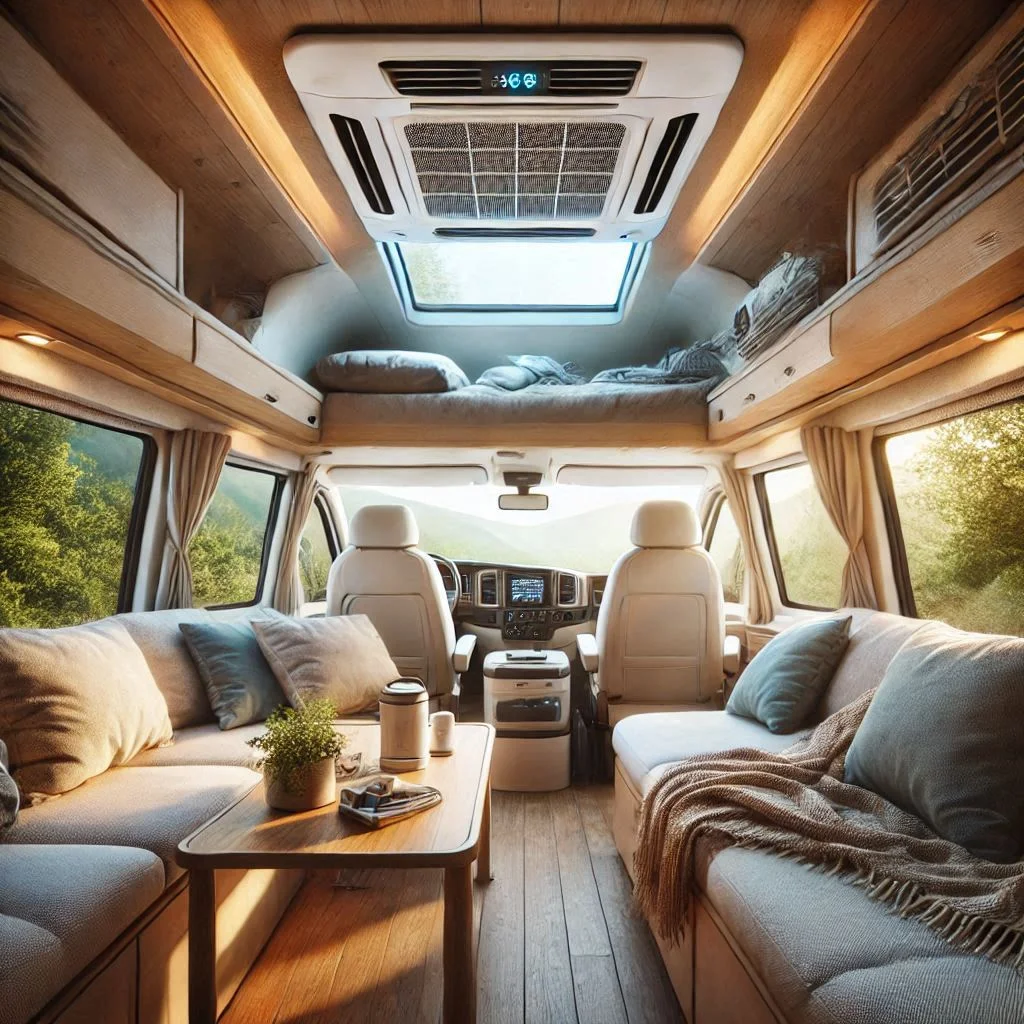
Importance of Choosing the Right AC for Your Camper Van
Selecting the best air conditioner for your camper van is not just about keeping cool—it’s about balancing efficiency, power usage, and comfort. The right AC system can greatly enhance your camper van lifestyle, making long trips in hot or humid climates far more enjoyable. However, choosing the wrong unit can lead to wasted energy, excessive noise, or even inadequate cooling.
There are various factors to consider when choosing the ideal air conditioner for your camper van. First and foremost is the size of your van. A larger van will require a more powerful air conditioning unit, while a smaller van might do well with a more compact, portable option. Next, think about the energy source—solar power, battery power, or a combination of both. Ensuring that the air conditioner is compatible with your power setup is crucial to prevent battery drain and energy inefficiency.
Another important factor is the climate you plan to travel in. If you’re heading to areas with high temperatures, a powerful air conditioning unit with higher cooling capacity (measured in BTUs) will be essential. However, if you’re mainly traveling in cooler climates, a more energy-efficient, quieter unit might be sufficient. Noise level is another critical consideration for camper van owners who value a peaceful, quiet environment.
Finally, think about maintenance and installation. A good air conditioner should be easy to install and maintain, with filters that are easy to clean and a system that’s durable enough to withstand the bumps and vibrations of the road. The right unit will provide long-lasting comfort while minimizing your time spent on upkeep.
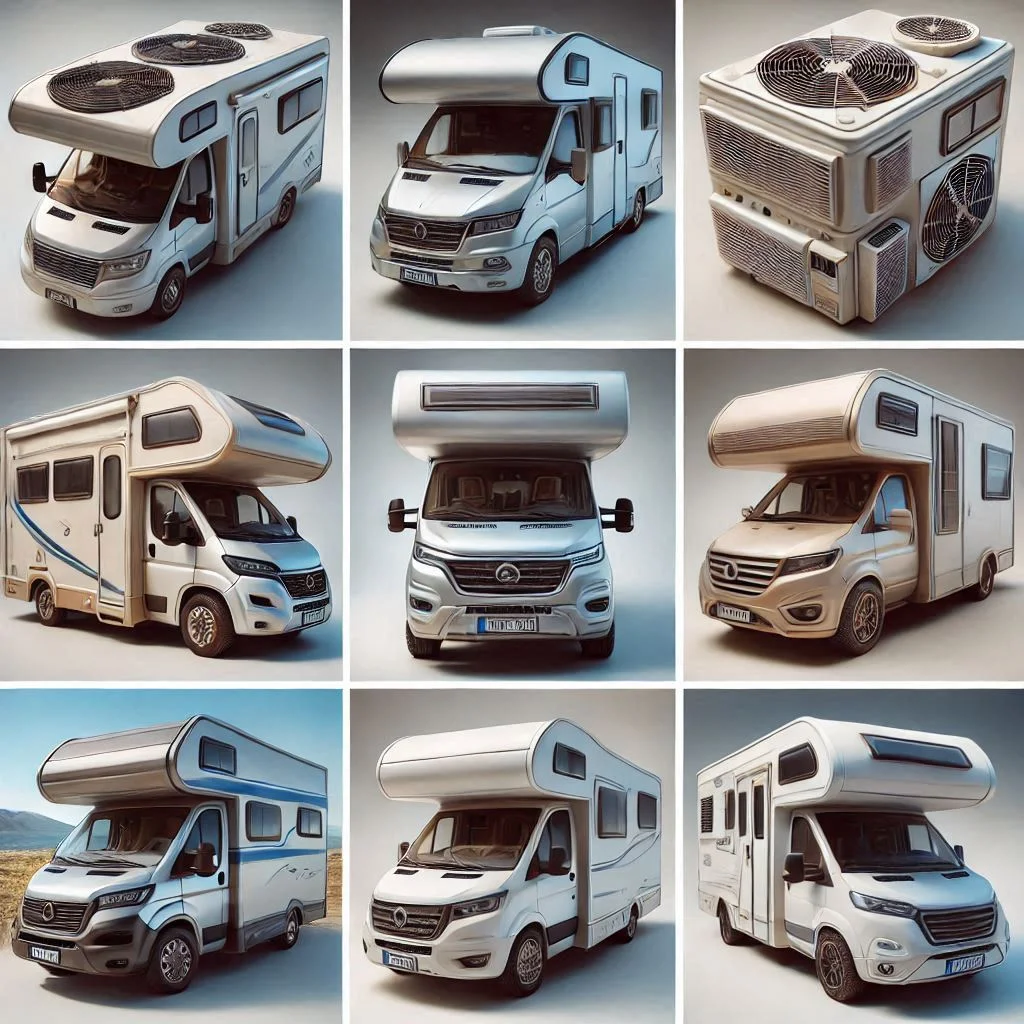
Types of Air Conditioners for Camper Vans
When choosing the best air conditioner for your camper van, one of the first decisions you’ll need to make is the type of AC unit that suits your needs. Each type of air conditioner has its own advantages and is designed for different situations and preferences. In this section, we will explore the most popular types of air conditioning systems available for camper vans: ducted, non-ducted, rooftop, and portable.
Ducted Air Conditioners
Ducted air conditioners are ideal for larger camper vans or RVs with multiple rooms or zones that require cooling. These systems are designed to distribute cool air through a network of ducts placed throughout the van. A ducted system allows for more even airflow and better temperature control, ensuring that every corner of your camper van stays comfortable.
The main advantage of ducted AC systems is their ability to cool larger spaces more efficiently. They are perfect for families or those who frequently travel with other passengers, as they ensure that every seat in the van is cool. Additionally, ducted systems are typically quieter than other types of air conditioners, as the compressor and fans are housed in a separate unit, reducing the noise inside the living area.
However, ducted systems can be more complex to install and may require professional help for proper setup. They also tend to be more expensive than non-ducted units due to their advanced features and installation requirements.
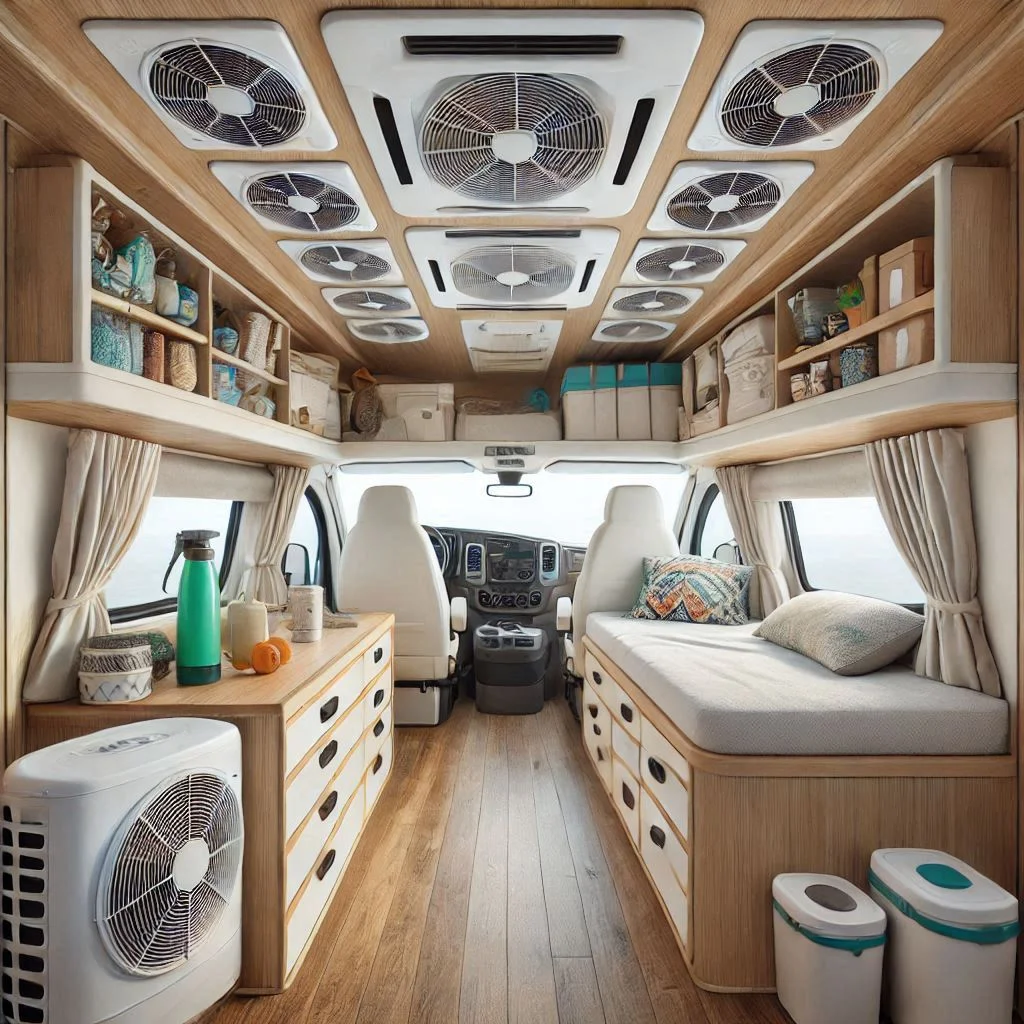
Non-Ducted Air Conditioners
Non-ducted air conditioners are a great option for smaller camper vans where space is limited or if you don’t need to cool multiple rooms at once. These systems work by cooling the air in the immediate vicinity of the unit, usually through an evaporative cooling system or a direct air conditioner. Non-ducted AC units are more compact and easier to install compared to ducted systems, making them an excellent choice for those with limited installation space.
One key advantage of non-ducted systems is their affordability and simplicity. They require fewer components than ducted systems, making them cost-effective both in terms of installation and maintenance. However, they may not cool larger spaces as evenly or efficiently as ducted units, and you might need to rely on multiple units if you have a larger van.
Non-ducted air conditioners are ideal for solo travelers or couples who prioritize efficiency over capacity. They are quieter than larger systems and offer a straightforward, no-fuss installation.
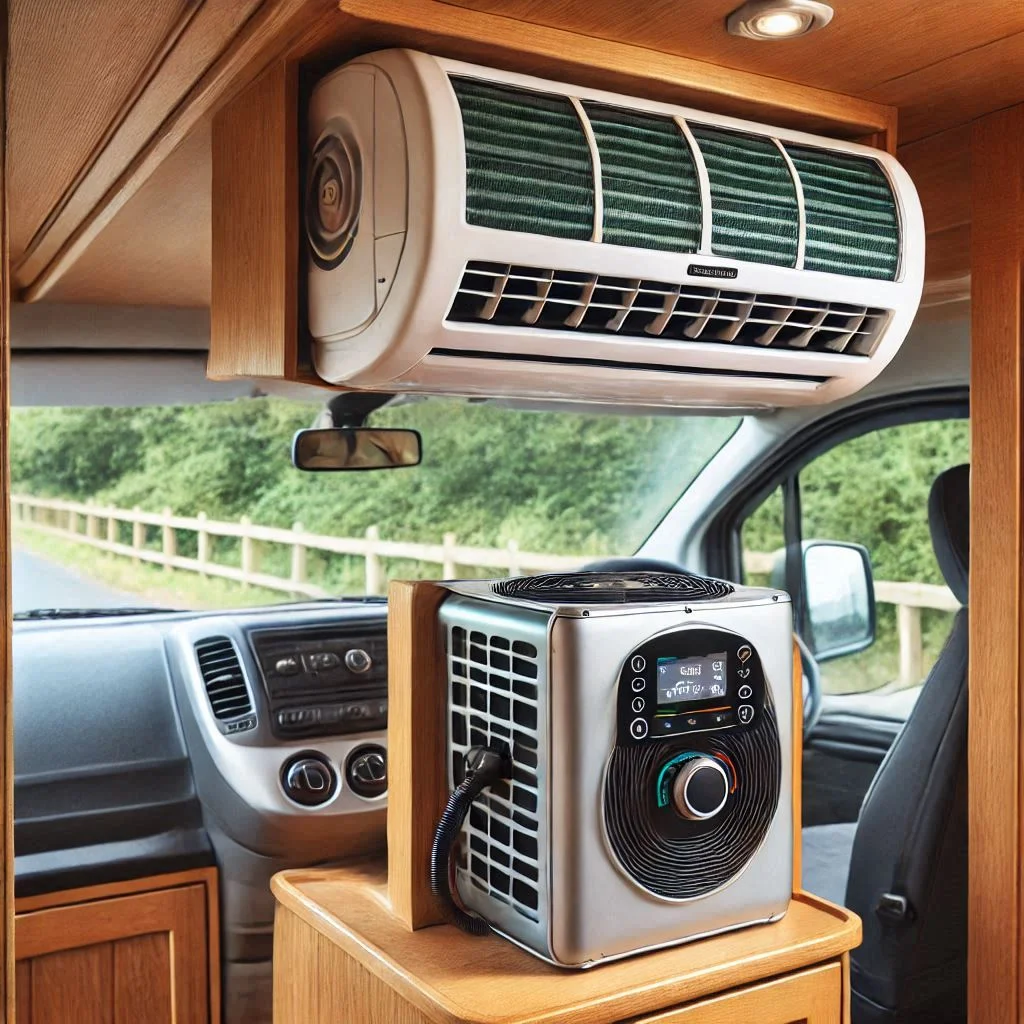
Rooftop Air Conditioners
Rooftop air conditioners are the most common type of AC for camper vans, RVs, and other mobile homes. These units are installed on the roof of the camper van and work by circulating cool air into the interior through ceiling vents. Rooftop air conditioners are often preferred because they save interior space and allow for more flexible design options within the van itself.
These systems are highly efficient, as they draw cool air from outside and circulate it throughout the van, often using a combination of ducted and non-ducted systems. Rooftop ACs are particularly useful for larger camper vans, as they can handle more substantial cooling needs. They are also relatively easy to install and come in both standard and low-profile versions, allowing for greater flexibility in terms of height and aerodynamics.
However, rooftop air conditioners can be noisy, especially when operating at higher speeds, and they may consume more power compared to non-ducted units. The installation process requires careful consideration to ensure that the roof can support the weight and that the system is properly sealed to prevent leaks.
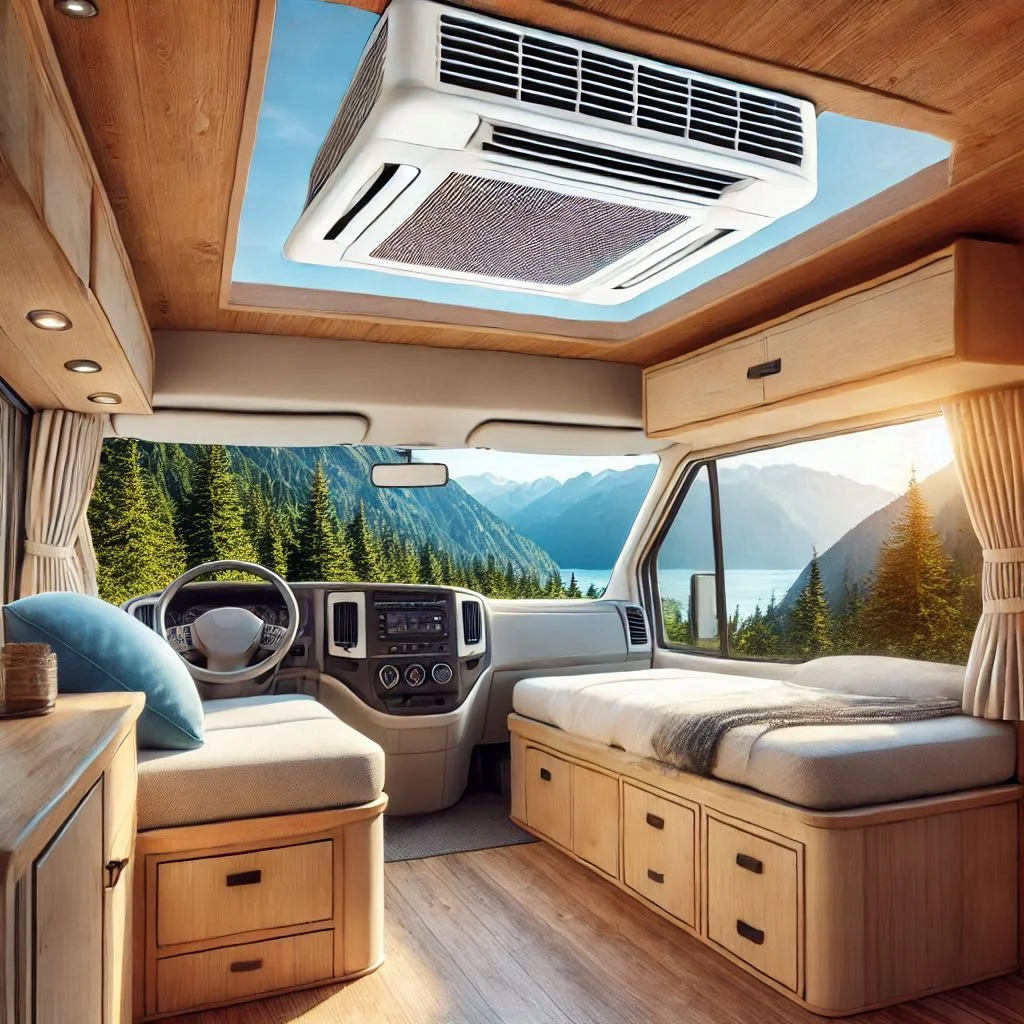
Portable Air Conditioners
Portable air conditioners are becoming increasingly popular for camper van owners looking for a flexible and mobile cooling solution. These units are designed to be easy to transport and install, offering a practical solution for those who want to move the AC unit from one spot to another within the van or even take it outside.
Portable AC units are typically smaller and require less installation than other types. They are perfect for those who need cooling in a single area or want to move their unit around as needed. However, portable air conditioners generally have a lower cooling capacity and may not be suitable for larger spaces or vans with high cooling demands.
One major downside of portable air conditioners is that they tend to be noisier than other types due to their compact design. Additionally, they require ventilation through a window or vent to expel warm air, which might be challenging to set up in some camper vans. Despite these drawbacks, portable air conditioners are an excellent choice for budget-conscious travelers or those who need a temporary cooling solution.
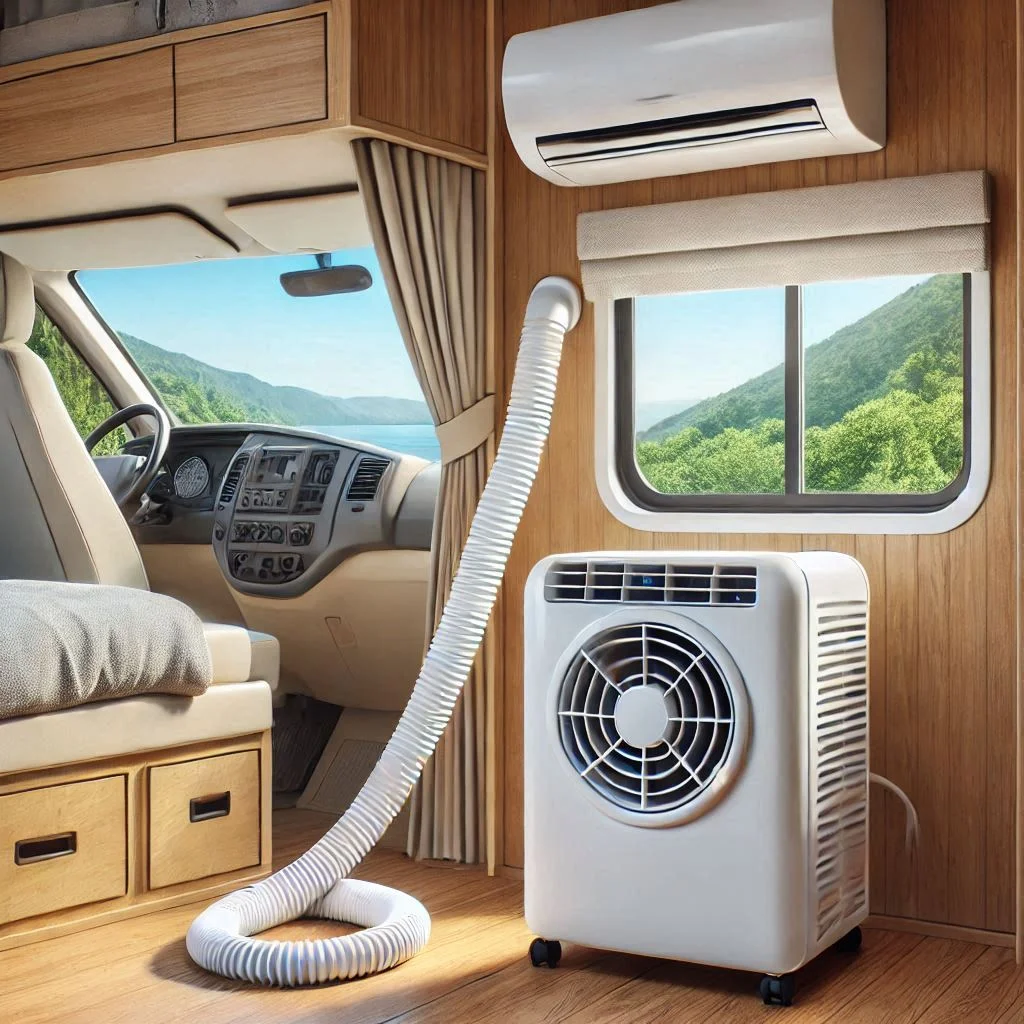
Key Factors to Consider When Choosing the Best Air Conditioner for Your Camper Van
Choosing the best air conditioner for your camper van involves careful consideration of several key factors to ensure you get the best value for your money and long-term comfort. Each factor plays a crucial role in how well the air conditioning unit will serve your needs while traveling. In this section, we will explore the critical factors to consider when choosing an air conditioner: Efficiency and Power Consumption, Cooling Capacity (BTU), Noise Level, Durability and Design, and Ease of Installation.
Efficiency and Power Consumption
When selecting an air conditioner for your camper van, energy efficiency is one of the most important factors to consider. Since camper vans typically rely on limited power sources, such as batteries or solar panels, choosing an efficient air conditioning system can help reduce strain on your power setup. Efficient air conditioners use less energy while delivering the desired cooling effect, which is especially important if you’re camping off-grid or on long trips where power resources are limited.
Look for air conditioning units that are designed to optimize energy consumption. Modern 12V air conditioners and inverter-driven units are known for their ability to deliver more cooling power while consuming less energy. Units that have energy-saving features, such as automatic fan speed adjustment and eco-modes, can help minimize energy consumption without sacrificing performance.
By choosing a highly efficient model, you’ll ensure that your camper van’s air conditioning system will last longer and provide consistent cooling without draining your batteries too quickly.
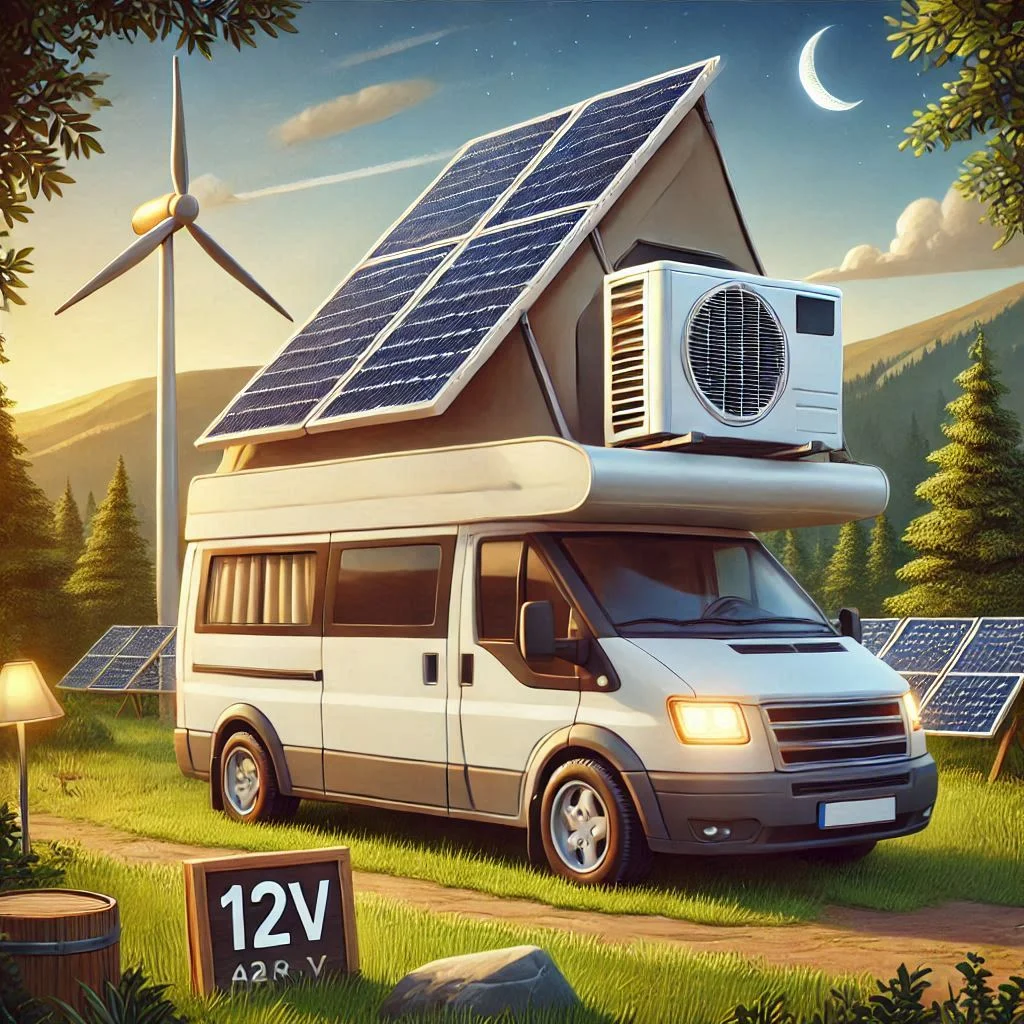
Cooling Capacity (BTU)
Cooling capacity, measured in British Thermal Units (BTU), is another vital factor to consider when selecting an air conditioner for your camper van. The BTU rating indicates how much heat the air conditioner can remove from the air in a given time, and it directly correlates to the size of the space it can cool.
For smaller camper vans or spaces, a unit with a lower BTU rating may suffice (5,000 to 8,000 BTUs). However, larger camper vans or RVs will require higher BTU ratings (10,000 to 15,000 BTUs) to cool the space effectively. Choosing an air conditioner with the right cooling capacity ensures that you don’t overwork the system, which can lead to energy waste, or underwork it, which could result in inadequate cooling.
It’s essential to match the BTU capacity to the size of your camper van’s interior. A general rule of thumb is that you need about 20 BTUs per square foot of space. If you plan to camp in extremely hot climates, consider choosing an air conditioner with a slightly higher BTU rating to compensate for higher external temperatures.
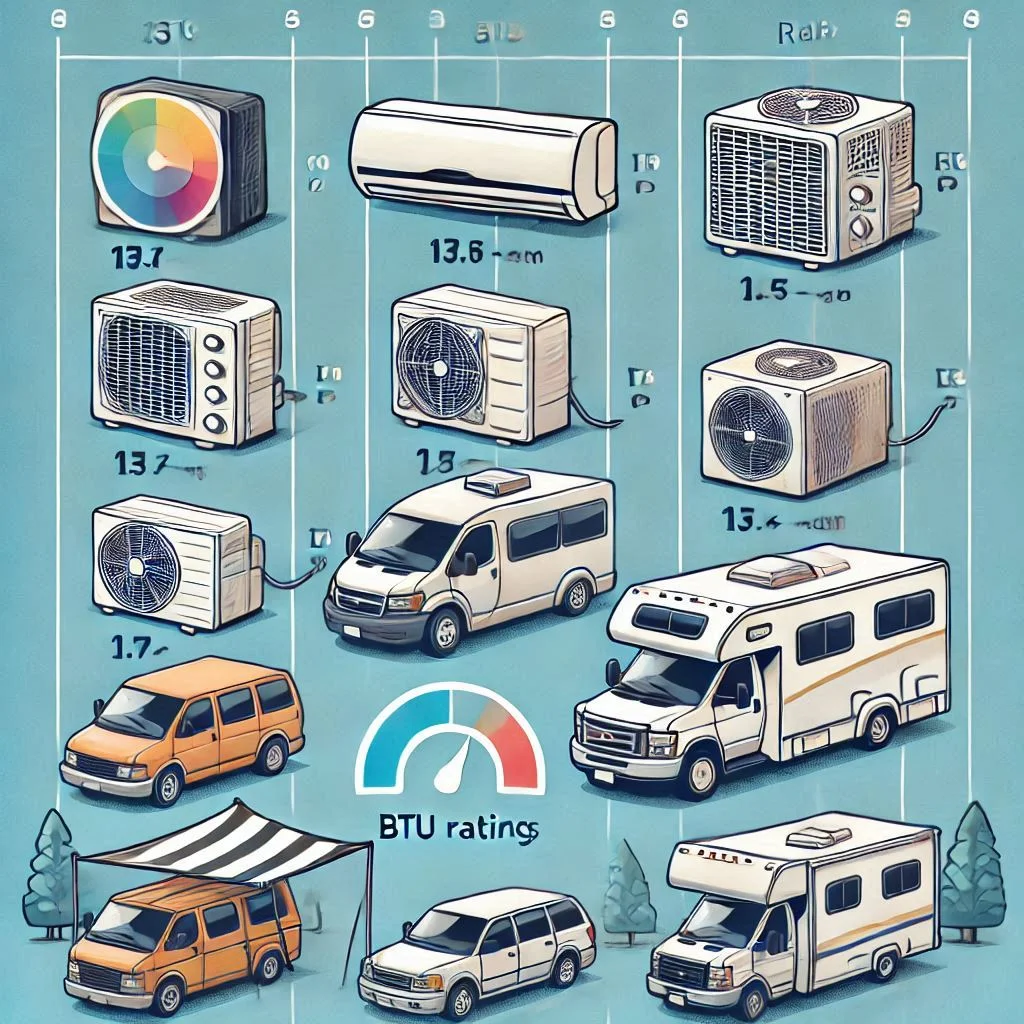
Noise Level
Noise level is often overlooked when choosing an air conditioner for a camper van, but it is an important consideration. While air conditioners are necessary for comfort, the sound they produce can significantly impact your overall experience. Loud AC units can interfere with your ability to relax, sleep, or enjoy quiet time in your camper van. This is particularly true if you’re traveling in areas where peace and quiet are a priority.
Look for air conditioners that are specifically marketed as “quiet” or “low-noise.” Many modern rooftop and non-ducted units are designed with noise reduction technology, ensuring that they operate at a minimal decibel level. Also, consider where the air conditioning unit is installed—units placed outside or on the roof tend to be quieter inside the van, while portable units might produce more noise as they are located within the living space.
Before making your purchase, check the decibel rating (dB) of the unit. Lower decibel ratings (under 50 dB) are typically ideal for ensuring a peaceful atmosphere inside your camper van.
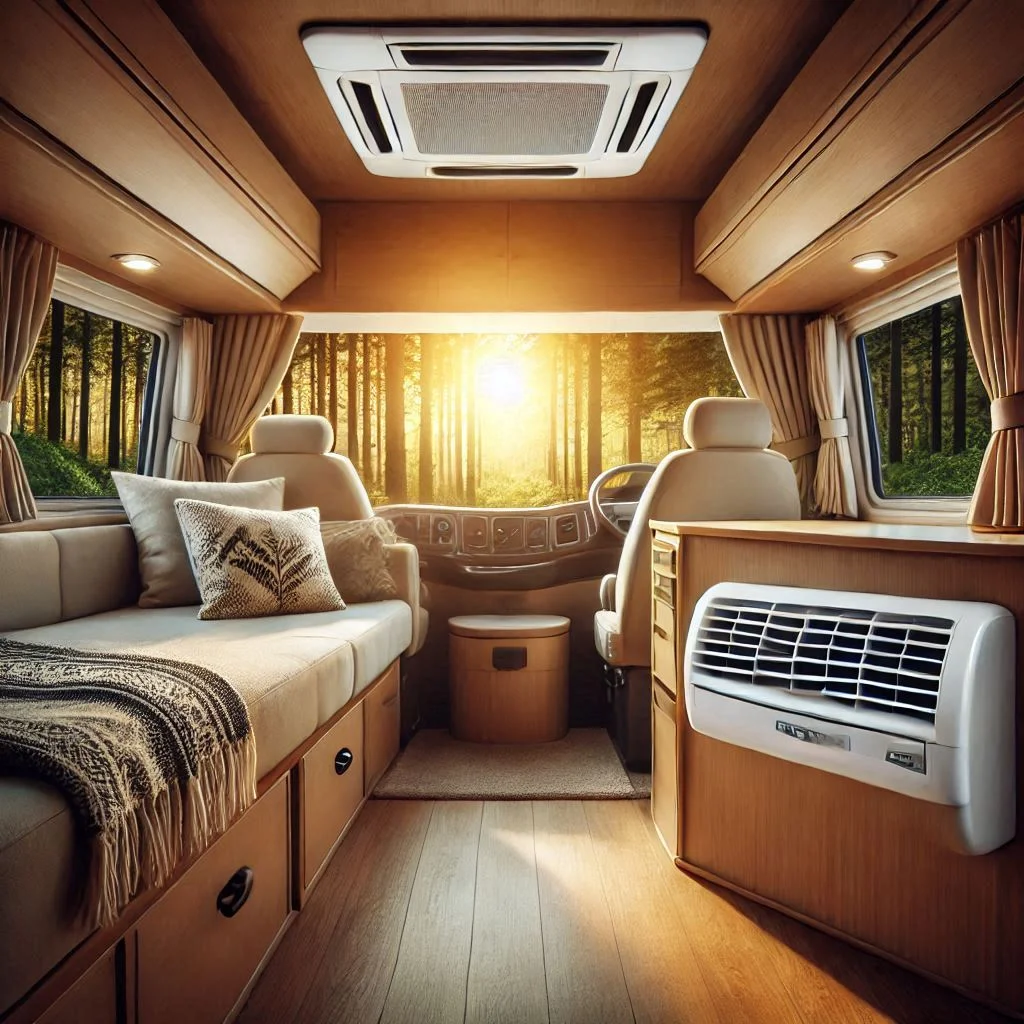
Durability and Design
The durability and design of an air conditioning unit are essential for ensuring that the system lasts through the rigors of traveling in a camper van. Camper vans face unique challenges, such as bumpy roads, vibrations, and temperature fluctuations, so it’s important to choose an AC unit that can withstand these conditions. Durability ensures that your air conditioner won’t break down or lose efficiency over time due to constant use.
Look for air conditioners made from high-quality materials, with reinforced frames and corrosion-resistant components, especially if you plan to use your van in varying climates. The design of the unit also matters in terms of ease of use and integration with your van’s interior. Opt for sleek, compact units that fit well into your space without taking up too much room or causing airflow obstruction.
Additionally, consider models with waterproofing or sealed enclosures to prevent damage from rain or moisture, as the outdoor elements can be a concern for camper van owners.
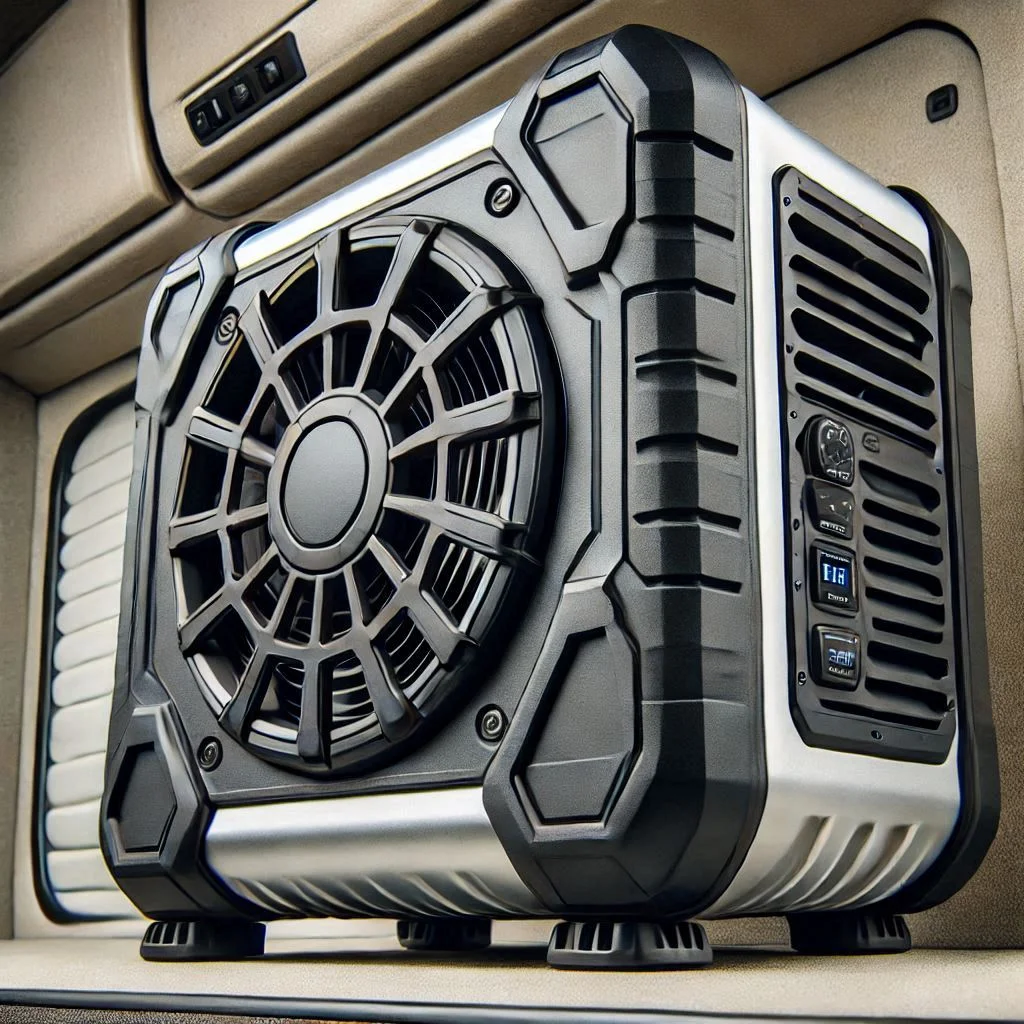
Ease of Installation
Finally, the ease of installation is an important factor in choosing an air conditioner for your camper van. Some units may require professional installation, especially ducted or rooftop systems that need to be mounted and sealed correctly to prevent leaks. On the other hand, portable and non-ducted units are typically easier to install and require little to no professional help.
When selecting an air conditioner, check whether it comes with clear installation instructions and whether the necessary tools and accessories are included in the package. Some units offer plug-and-play functionality, while others may require complex wiring or modifications to your van’s power system.
If you prefer a DIY installation, go for models that come with easy-to-follow guides and detailed instructions. Units with simple window-mounted or portable designs can be installed by most DIYers, saving you time and installation costs.
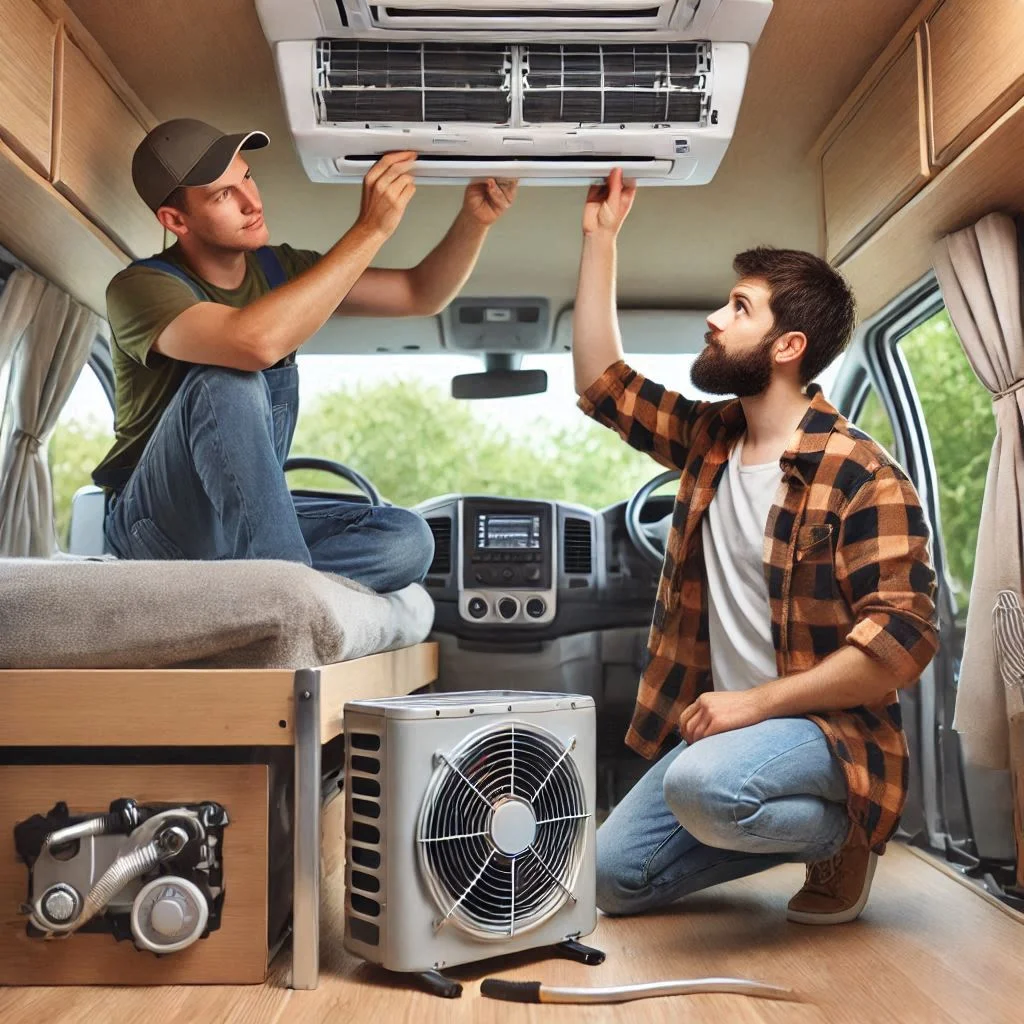
Powering Your Camper Van Air Conditioner
When it comes to powering your camper van air conditioner, understanding your power requirements and options is essential. The right power setup ensures that your air conditioning system operates efficiently, without draining your camper van’s power sources too quickly. This section will explore the key aspects of powering your camper van’s air conditioner, including power requirements, using solar panels, and battery and charging considerations.
Power Requirements for Air Conditioners
Before you install an air conditioner in your camper van, it’s crucial to understand the power requirements of the unit. Air conditioners typically require significant power to operate effectively, so knowing how much power your unit consumes (measured in watts) will help you choose the right power system for your van.
The power consumption of an air conditioner varies based on its size, cooling capacity (BTU), and efficiency. For example, a standard rooftop air conditioner may consume around 1,200 to 1,800 watts, while smaller portable or non-ducted units may consume 500 to 1,000 watts. It’s important to match the power consumption of your air conditioner to your available power source, whether that’s a generator, solar panels, or battery system.
To calculate the total power required for your air conditioner, consider both the AC unit’s running wattage and its starting wattage. Air conditioners generally have a higher starting wattage when they first turn on, so ensure that your power setup can handle both the peak and continuous power demands.
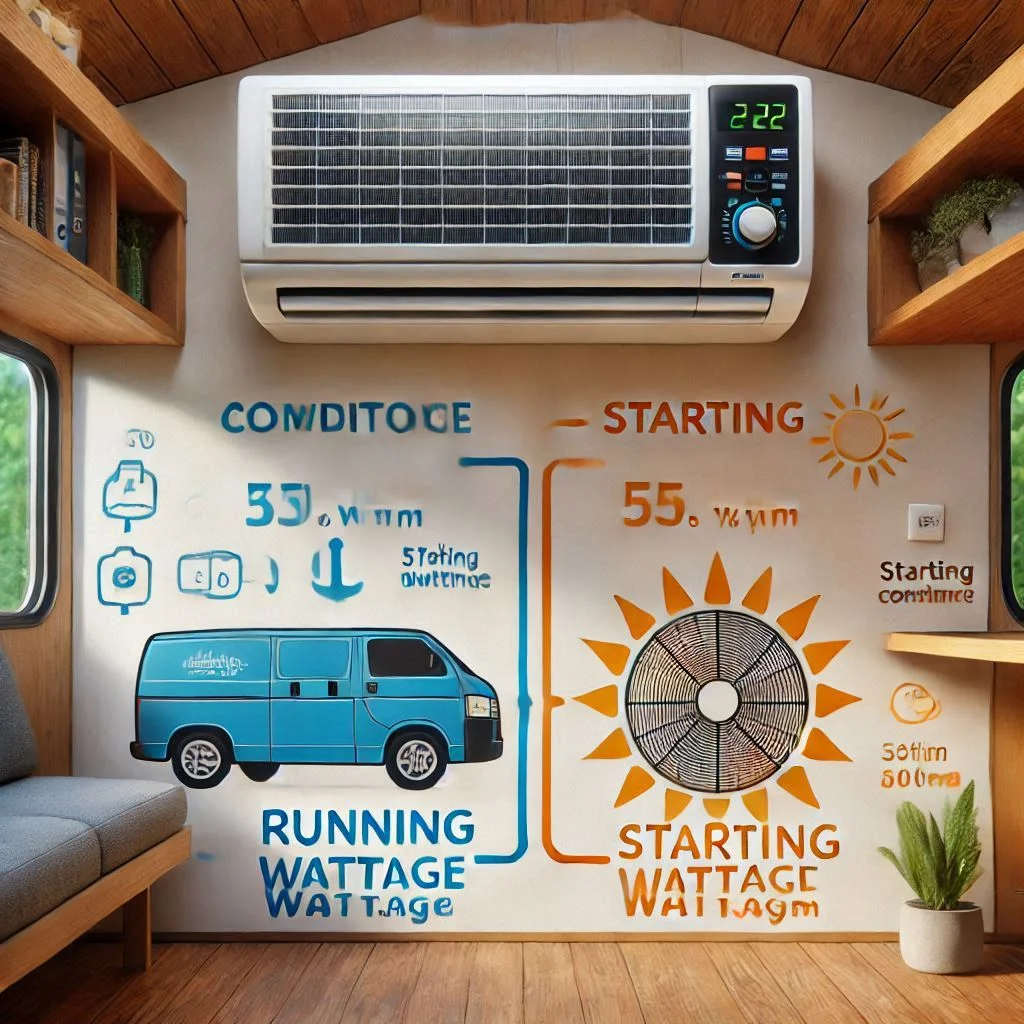
Using Solar Panels for Air Conditioning
Solar power is a popular and eco-friendly way to power your camper van’s air conditioner, especially if you plan to camp off-grid or in remote areas where access to electrical hookups is limited. Solar panels provide a renewable energy source that can recharge your batteries and power your air conditioning system.
The first step in using solar power for air conditioning is determining how many solar panels you need to generate sufficient energy. The amount of energy produced by solar panels depends on factors such as panel size, efficiency, and sunlight hours. A typical 100-watt solar panel generates around 300-400 watt-hours of energy per day in full sun.
For air conditioners, you may need a solar setup capable of generating 1,200-1,800 watts of energy, depending on the size of your AC unit. If you plan to use solar panels for continuous cooling, you’ll also need a battery bank to store energy for nighttime use. To avoid running out of power, ensure your solar array can generate enough energy during the day to meet both your cooling and general power needs.
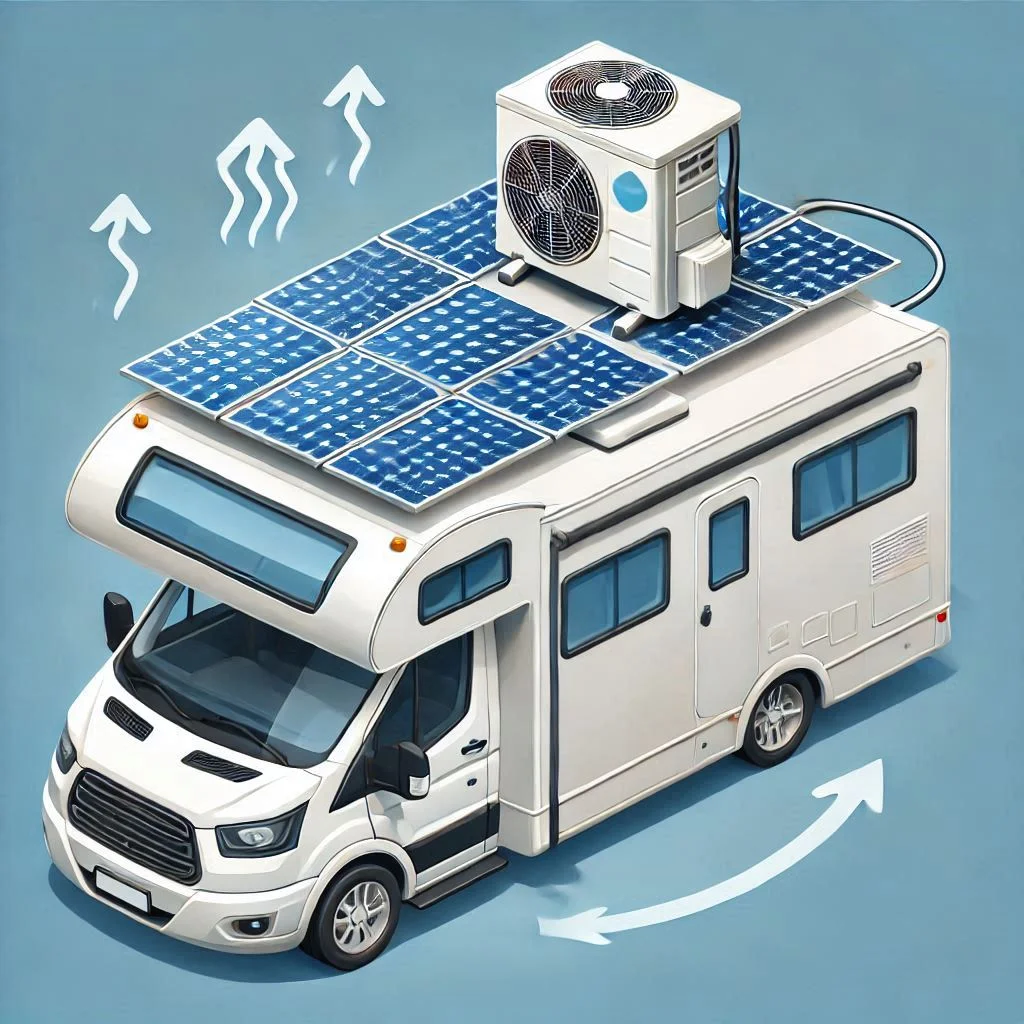
Battery and Charging Considerations
When using an air conditioner in a camper van, it’s essential to have a reliable battery and charging system to store and provide power. While solar panels can provide energy during the day, you’ll need a battery bank to store that energy for use when the sun is down or when you’re not connected to the grid.
Deep cycle batteries, commonly used in camper vans and RVs, are designed to handle repeated charging and discharging, making them ideal for running air conditioning units. The size and capacity of your battery bank will depend on the power needs of your air conditioner and other appliances in your van.
When choosing a battery, it’s important to consider the amp-hour (Ah) rating, which indicates how much energy the battery can store. A larger battery bank (around 400Ah to 600Ah) is recommended for powering an air conditioner over extended periods. Lithium-ion batteries are becoming increasingly popular in camper vans due to their lightweight design and longer lifespan compared to traditional lead-acid batteries.
Additionally, you’ll need an efficient charging system to ensure that your batteries remain charged. Solar charge controllers and inverters are essential for converting the solar energy into a usable form and regulating the power flow to your battery bank. Make sure your charging system is capable of keeping up with the power demands of your air conditioning system.
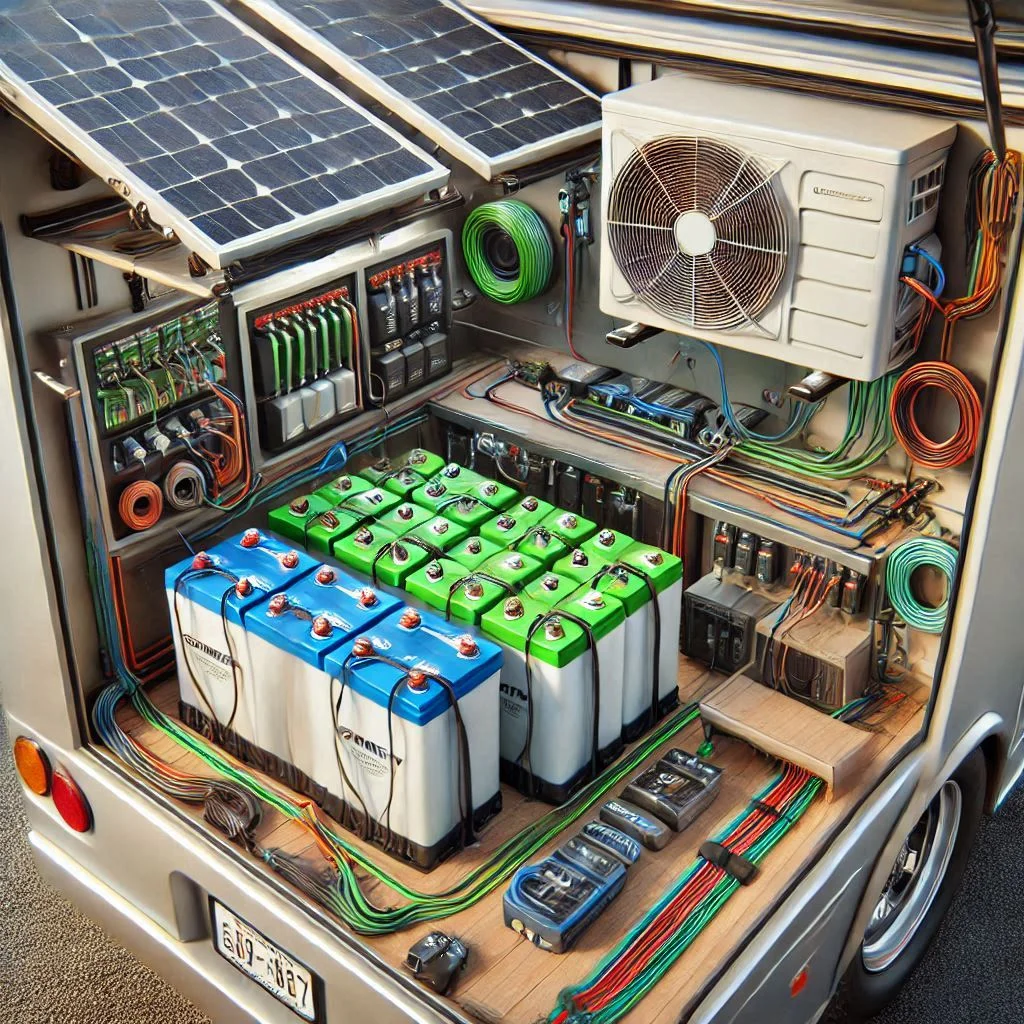
Installation and Maintenance of Camper Van Air Conditioners
Proper installation and regular maintenance are crucial for ensuring that your camper van’s air conditioner runs smoothly and lasts for years to come. In this section, we will provide a Step-by-Step Installation Guide, share Routine Maintenance Tips, and offer advice on how to Troubleshoot Common Issues. These guidelines will not only help you maintain your air conditioner efficiently but also prevent costly repairs in the future.
Step-by-Step Installation Guide
Installing an air conditioner in your camper van may seem like a complex task, but with the right tools and instructions, it can be a manageable DIY project. Here’s a comprehensive, step-by-step guide to help you get your AC unit up and running:
- Choose the Right Location:
Before installation, decide where you want to install your air conditioner. Rooftop units are the most common choice for camper vans, as they don’t take up valuable interior space. Non-ducted or portable units can be placed inside, but make sure they are near a power outlet and have adequate ventilation. - Prepare Your Power System:
Before installing your AC, make sure your power system (batteries, solar panels, or generator) is sufficient for the AC unit’s power requirements. You may need to install an inverter or ensure that your battery bank has enough capacity to support the unit. - Install the Unit (Rooftop Example):
For a rooftop unit, you’ll need to create an opening in the van’s roof where the air conditioner will sit. Measure and mark the location carefully before cutting. Secure the unit in place using bolts or screws, making sure the unit is level and sealed properly to prevent leaks. - Connect the Ducting and Ventilation:
If you’re installing a non-ducted system, you’ll need to attach the air conditioning unit to the van’s ducting system. This involves securing ducts that will route cool air into the living space and hot air out. Ensure all connections are tight to avoid air leakage. - Electrical Wiring:
Connect the AC unit’s power cables to your battery or power source. If using an inverter, make sure to follow the manufacturer’s guidelines for wiring and ensure you have the correct fuses in place for safety. - Test the Unit:
Once the unit is securely installed and powered, turn it on and check for functionality. Make sure it’s cooling efficiently and there are no unusual noises or issues. Test all features to ensure the system is working as expected.
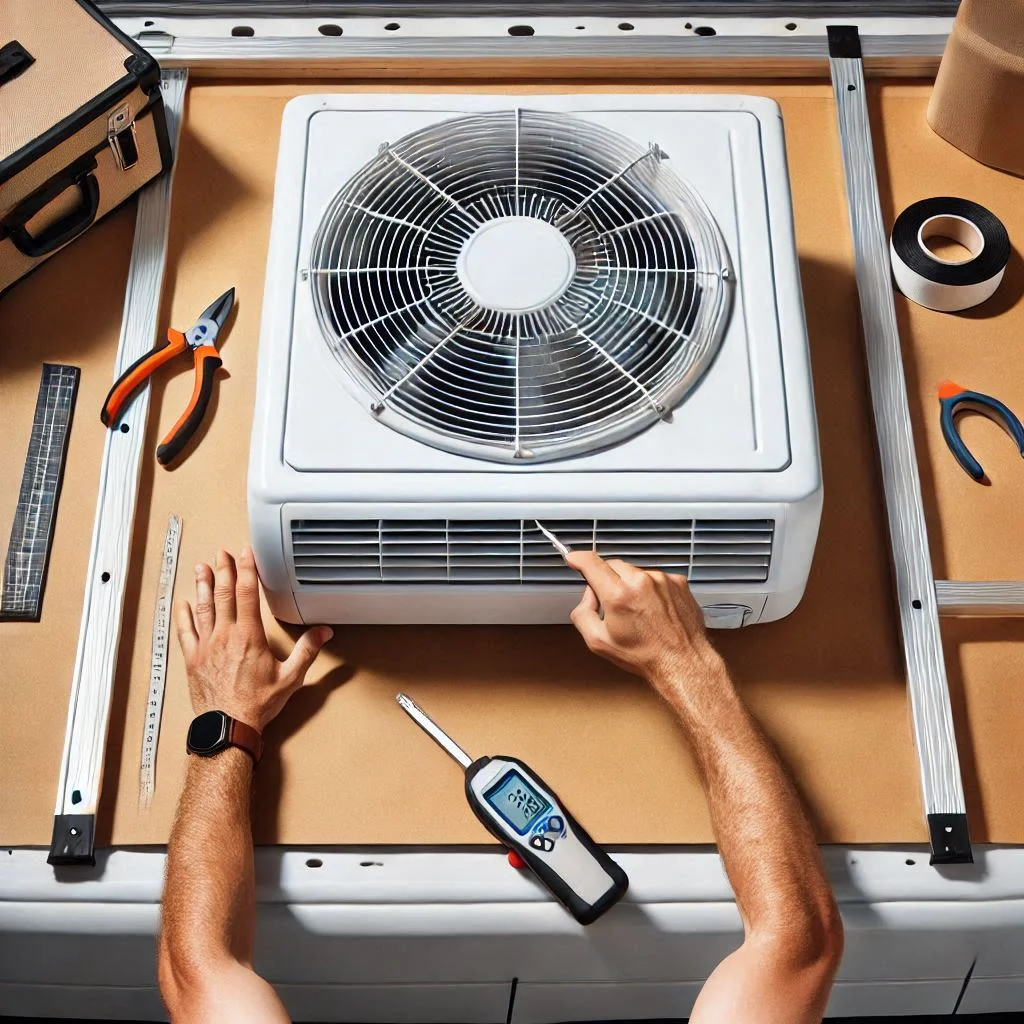
Routine Maintenance Tips
Maintaining your camper van’s air conditioner is essential to ensure it runs efficiently and lasts longer. Regular maintenance will help you avoid major repairs and improve the cooling performance of your unit. Here are some key maintenance tips:
- Cleaning Filters:
Dirty filters can restrict airflow, reduce cooling efficiency, and lead to higher energy consumption. To keep your air conditioner running at peak performance, clean or replace the filters regularly. Depending on the type of filter, this should be done every 1-3 months. - Cleaning the Coils:
Over time, the coils inside your air conditioner can accumulate dust and grime. Dirty coils reduce the efficiency of the unit and may cause it to overheat. Clean the evaporator and condenser coils with a soft brush and, if needed, use coil cleaner to remove stubborn dirt. - Refilling Refrigerant Gas:
If your air conditioner isn’t cooling properly, it might be due to low refrigerant levels. Low refrigerant can cause the compressor to malfunction and lower the overall cooling power. Consult a professional technician to refill the refrigerant gas when needed. - Check for Leaks:
Leaks in the air conditioning system can prevent it from cooling effectively and cause energy loss. Regularly inspect the system’s seals and hoses to ensure there are no leaks. If you spot any, repair or replace the damaged components immediately. - Cleaning the Exterior:
Regularly clean the exterior of your AC unit, especially if you have a rooftop system. Dirt, leaves, and debris can accumulate, obstructing airflow. Keep the area around the unit clear to ensure it operates efficiently.
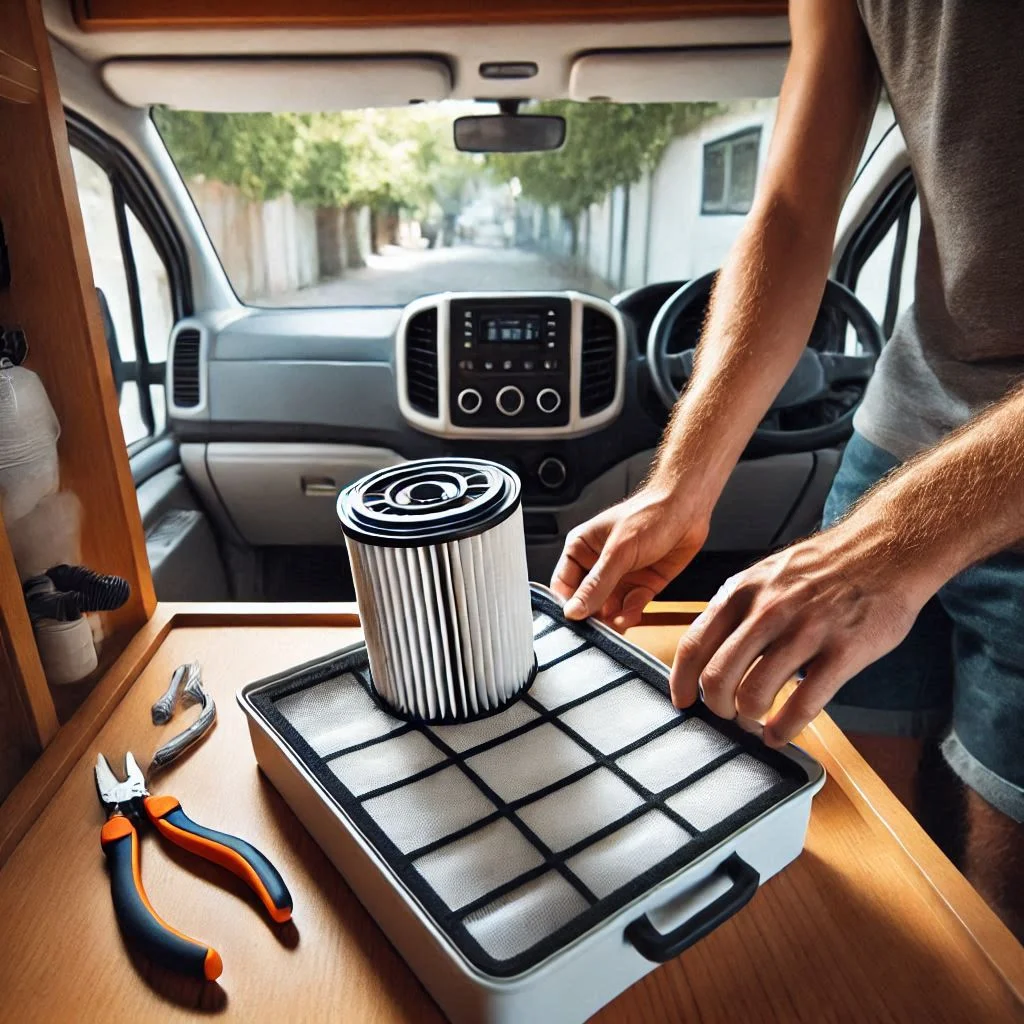
Troubleshooting Common Issues
While regular maintenance can prevent many issues, you may still encounter problems with your air conditioner from time to time. Here are some common issues and troubleshooting tips:
- Not Cooling Efficiently:
If your air conditioner isn’t cooling properly, check for dirty filters or coils, as these can restrict airflow. Also, ensure that the refrigerant levels are adequate. If these are fine, the compressor or thermostat may need attention. - Unusual Noises:
Noises such as rattling, buzzing, or whistling could indicate loose components, debris inside the unit, or a malfunctioning motor. Inspect the unit for any loose parts, and if the problem persists, consult a professional for further inspection. - Air Conditioner Not Turning On:
If the unit won’t turn on, check the power source, electrical connections, and fuse. Ensure that the batteries are charged and the inverter is functioning correctly. If you have a rooftop unit, inspect the rooftop seal to ensure it’s securely attached and no wiring is disconnected. - Water Leaks:
If water is leaking from the AC unit, the drainage system may be clogged, or the system may not be tilted properly to allow drainage. Clean the drainage channels and ensure the unit is properly aligned. - Foul Odors:
Unpleasant smells can indicate mold or bacteria buildup inside the unit. Clean the interior components, especially the evaporator coils and drain pan, to eliminate the source of the odor.
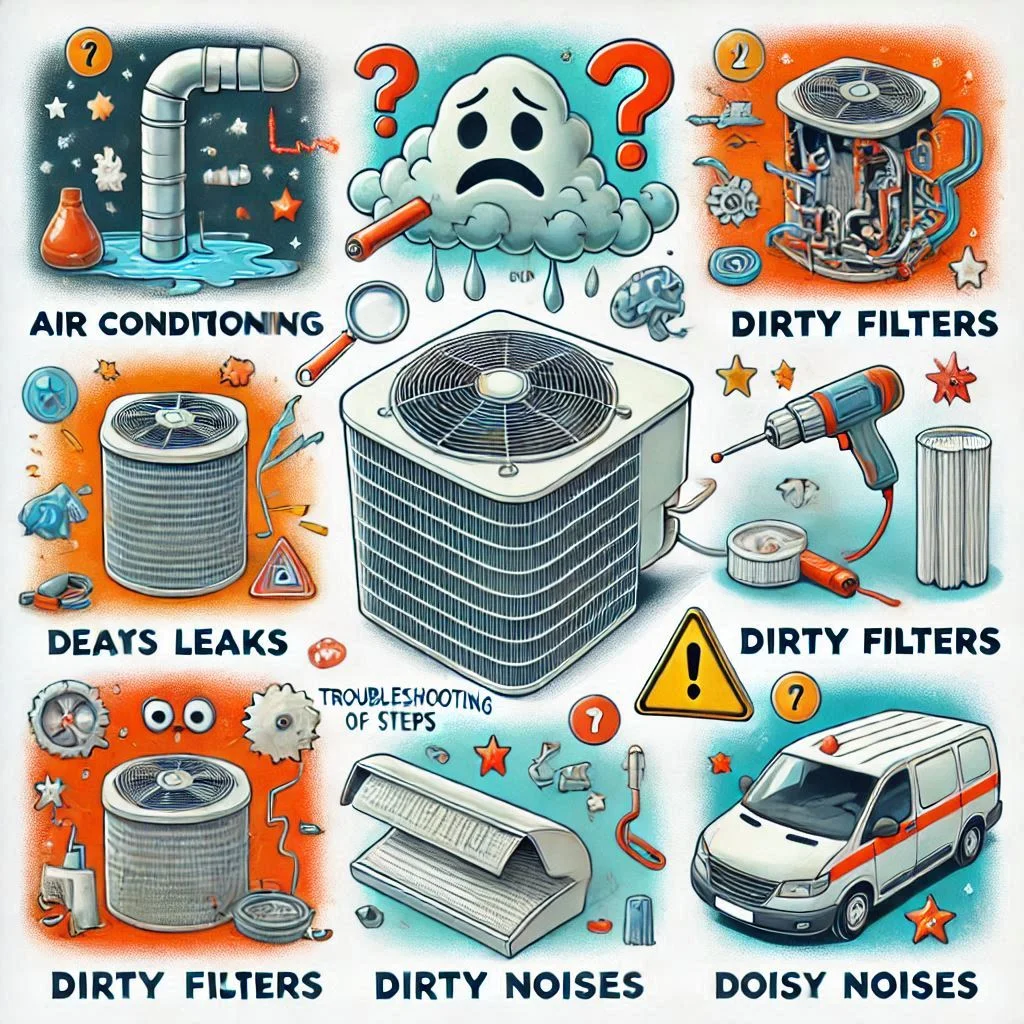
Best 12V Air Conditioners for Camper Vans
When it comes to keeping your camper van cool and comfortable during your travels, selecting the best 12V air conditioner is crucial. With a variety of options available, it’s essential to choose a model that suits your specific needs, whether it’s for overall performance, value, noise level, portability, or additional features such as heating. In this section, we’ll review the Best 12V Air Conditioners for Camper Vans across different categories, helping you make an informed decision.
Best Overall: Nomadic Cooling X2
The Nomadic Cooling X2 is one of the top-rated 12V air conditioners for camper vans, providing exceptional performance and durability. It is ideal for users who need a reliable, high-performance AC that can cool larger spaces effectively. This unit uses advanced technology to deliver impressive cooling power while maintaining energy efficiency, making it perfect for long trips where reliable cooling is essential.
Key Features:
- Cooling Capacity: 2,500 BTU (perfect for small to medium camper vans)
- Energy Efficient: Low power consumption, ideal for off-grid camping with solar panels.
- Durability: Built to last with rugged construction that withstands the wear and tear of constant use.
- Ease of Installation: Simple setup with included installation kits.
- Quiet Operation: Operates with minimal noise, ensuring you can enjoy a peaceful environment.
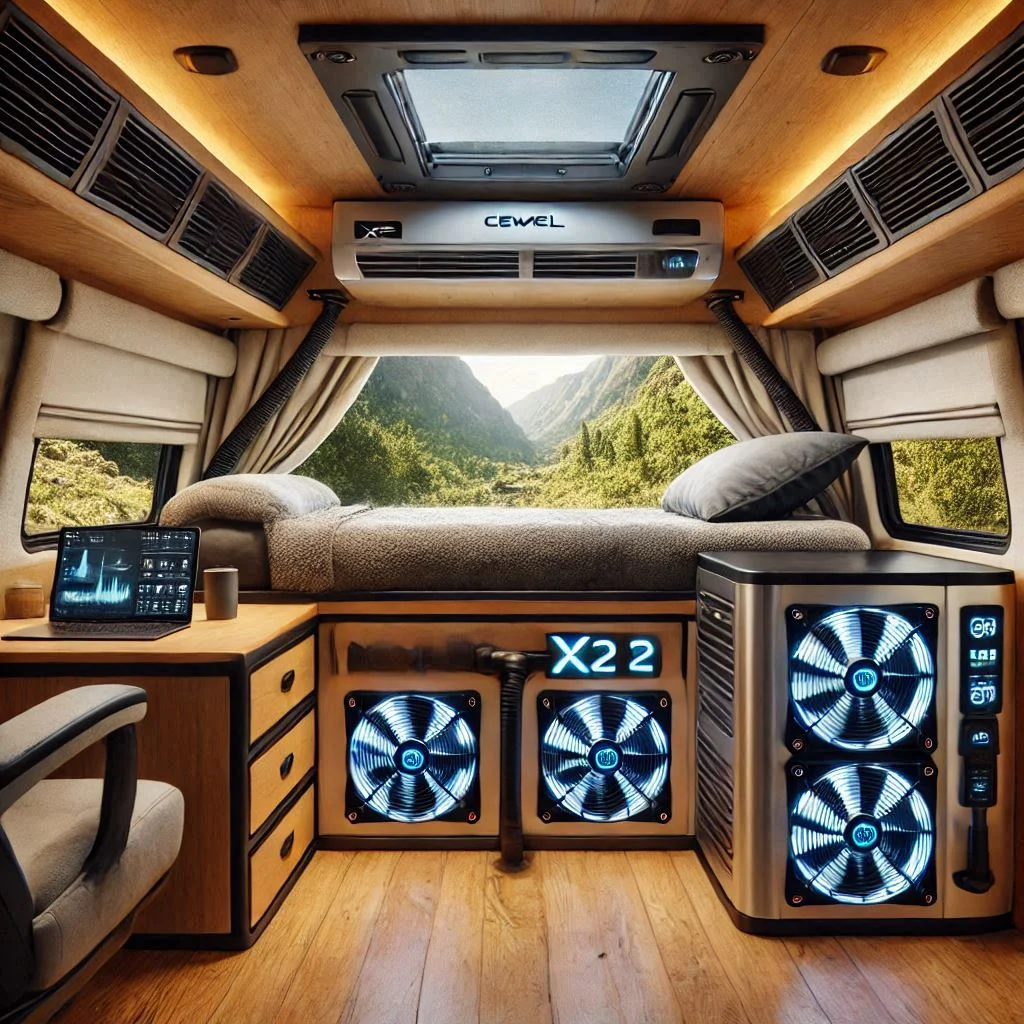
Best Value: Dometic RTX 2000
The Dometic RTX 2000 strikes the perfect balance between affordability and performance. It offers great cooling power at a price point that won’t break the bank, making it the best value option for many camper van owners. The RTX 2000 is designed to run off 12V power systems, ensuring that you can cool your van without draining your energy supply.
Key Features:
- Cooling Capacity: 2,000 BTU, efficient for medium-sized camper vans.
- Energy Consumption: Low power draw, ensuring your battery lasts longer.
- Compact Design: Space-saving unit that can be easily installed in the roof or wall.
- Reliable Performance: Proven reliability with long-term use.
- Affordable: Offers great value for money compared to other models with similar features.
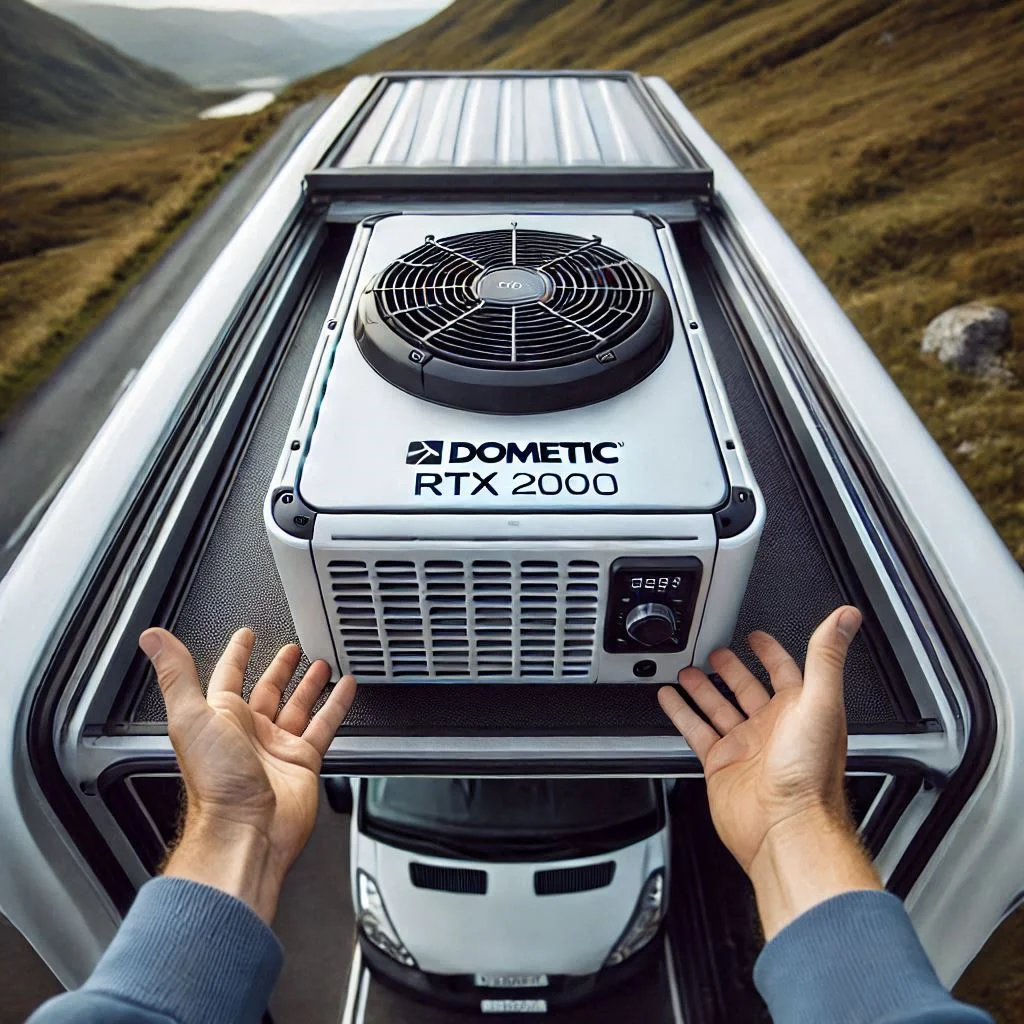
Best Quiet Model: B-Cool 12000RV
If you prioritize a quiet environment while camping or traveling, the B-Cool 12000RV is the best option for you. This model is renowned for its ultra-quiet operation, ensuring that you can enjoy cool air without the disruptive noise typical of most air conditioning units. It is designed with a noise-reducing mechanism, making it perfect for those who value tranquility in nature.
Key Features:
- Cooling Capacity: 12,000 BTU, powerful cooling suitable for large camper vans or RVs.
- Noise Level: Exceptionally low noise, making it one of the quietest air conditioners on the market.
- Energy Efficient: Low energy consumption while maintaining strong cooling output.
- Durability: Built to withstand heavy use over extended periods.
- Versatile: Suitable for a wide range of van sizes and configurations.
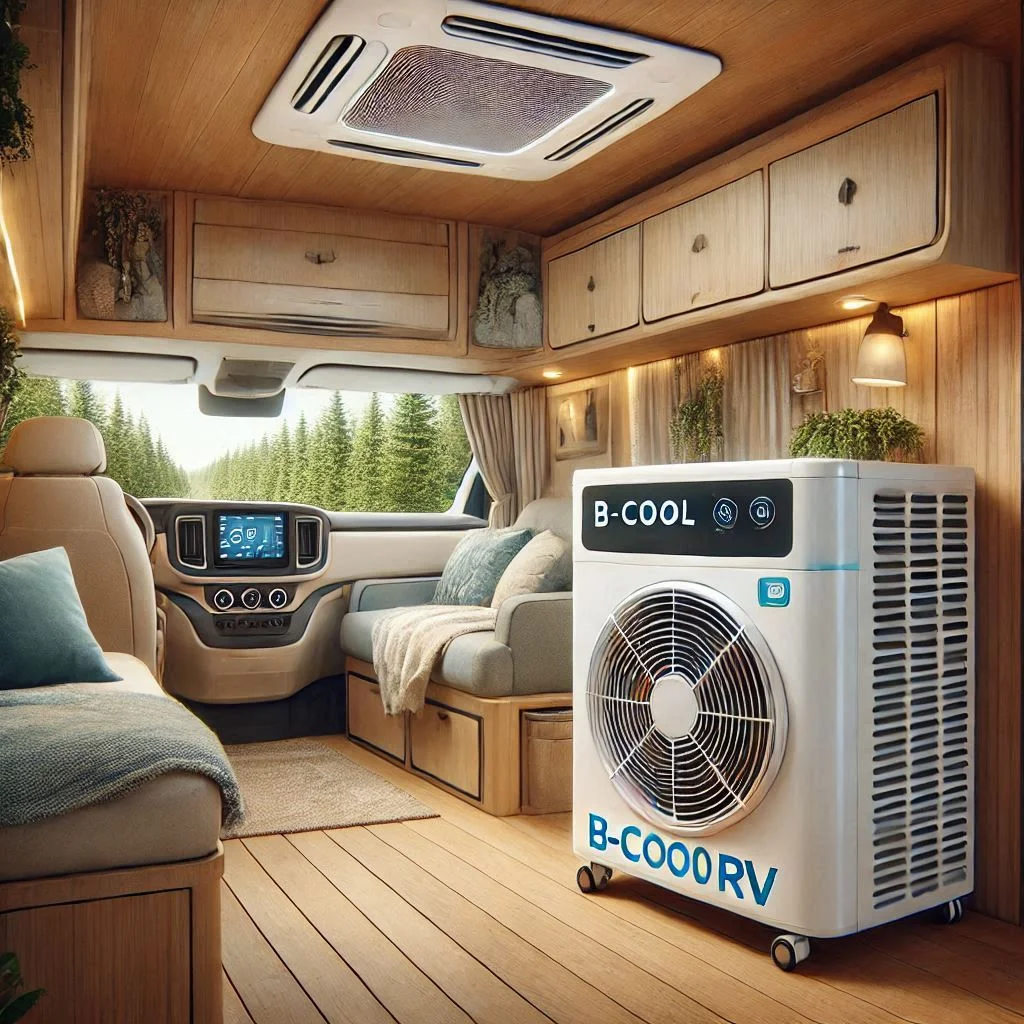
Best Portable: Zero Breeze Mark 2
The Zero Breeze Mark 2 is the best portable air conditioner for camper vans, designed for users who require flexibility in their setup. This compact and lightweight unit can be moved around the van as needed, making it ideal for smaller spaces or for those who prefer to take their air conditioner on the go.
Key Features:
- Cooling Capacity: 1,300 BTU, ideal for small camper vans and personal spaces.
- Portability: Lightweight and compact, making it easy to transport and store when not in use.
- Power Options: Can be powered by a battery, DC power, or a solar panel setup, making it a versatile choice for off-grid living.
- Versatility: Perfect for both cooling and dehumidifying.
- User-Friendly: Easy to set up and operate, making it a great option for first-time users.
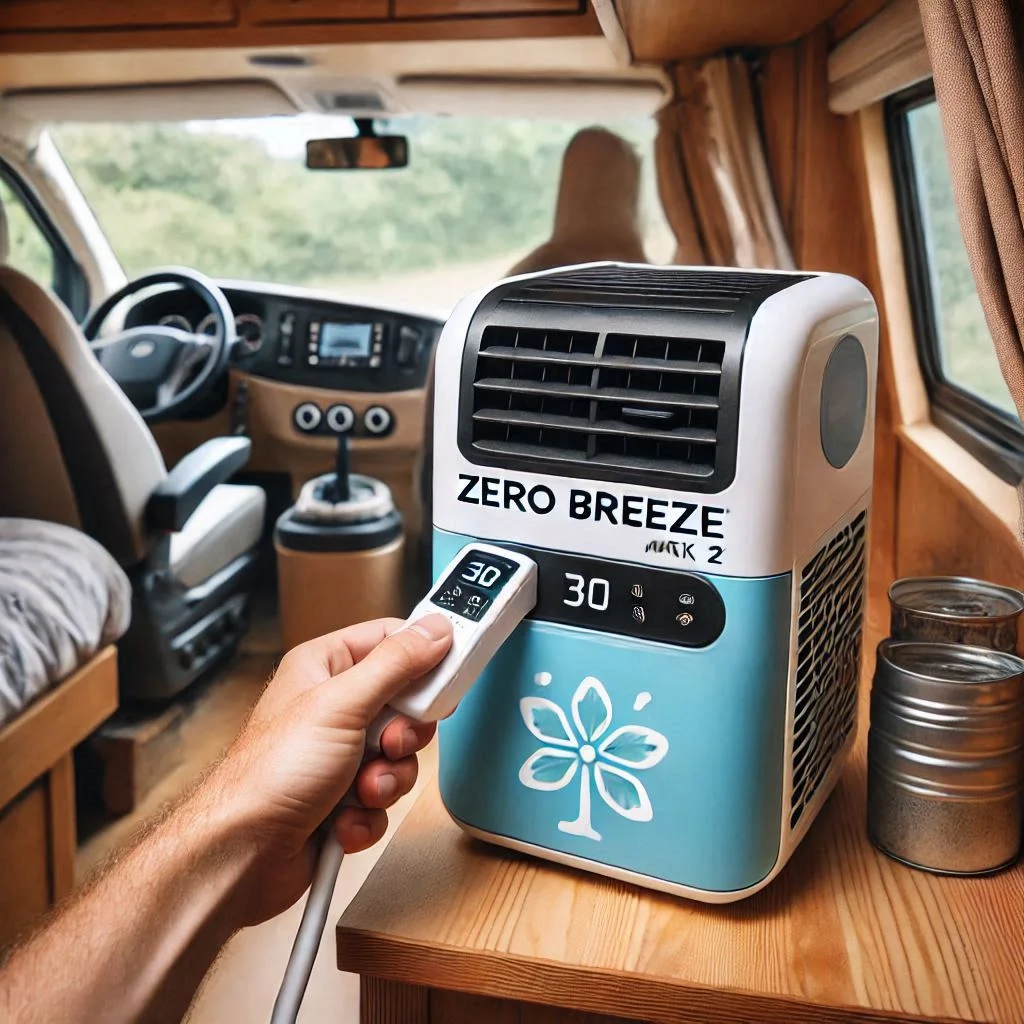
Best with Heating: EcoFlow Wave 2
The EcoFlow Wave 2 is a standout choice for those who want the added benefit of heating in addition to cooling. This versatile unit offers both cooling and heating functions, allowing you to maintain a comfortable temperature in your camper van year-round, regardless of the weather outside.
Key Features:
- Cooling and Heating: Dual function for both cooling in the summer and heating during colder months.
- Energy Efficient: Efficient energy consumption that ensures longer battery life.
- Smart Features: Built-in Wi-Fi for remote control and monitoring, making it a convenient choice for tech-savvy travelers.
- Portable Design: Easily moved and stored when not in use.
- Quiet Operation: Runs quietly, ensuring that your space remains peaceful and comfortable.
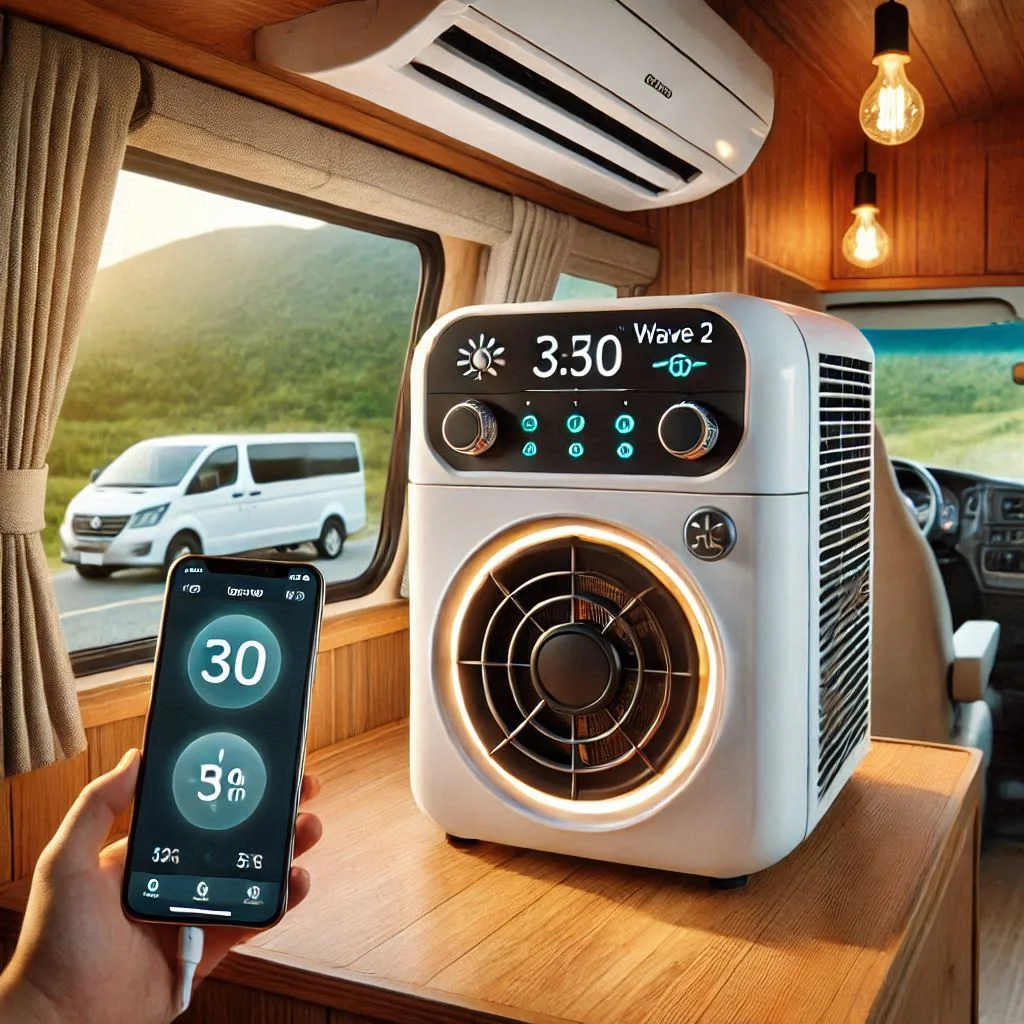
Best Heavy Duty: Cruise N Comfort USA HD-12L
For those who need an industrial-strength air conditioner for heavy-duty cooling in larger camper vans or RVs, the Cruise N Comfort USA HD-12L is an excellent option. Designed for maximum performance and longevity, this air conditioner is built to handle the most demanding conditions and provide consistent, high-powered cooling.
Key Features:
- Cooling Capacity: 12,000 BTU, designed for larger vehicles with more space.
- Heavy Duty: Built to endure harsh conditions and frequent use.
- Long-Lasting: Robust construction for extended lifespan and durability.
- Powerful Performance: Maintains consistent cooling even in extreme temperatures.
- Premium Build Quality: High-end materials ensure superior performance and longevity.
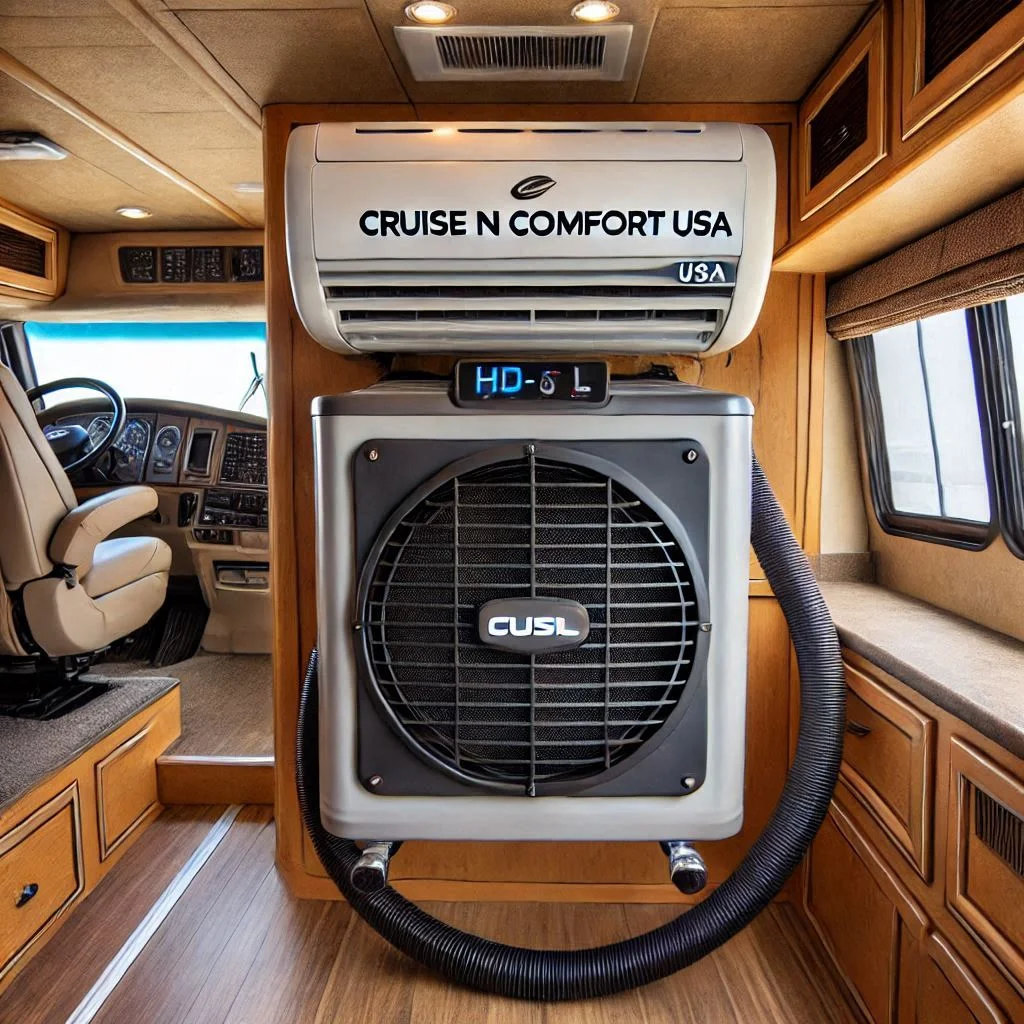
Tips to Keep Your Camper Van Cool
Keeping your camper van cool during your travels is essential for comfort and energy efficiency, especially when you’re on long road trips or camping in hot weather. Proper ventilation, insulation, and using the right appliances can significantly improve the effectiveness of your air conditioning system. Below are some practical tips to help you optimize the cooling efficiency of your camper van, ensuring that you stay comfortable no matter where your adventures take you.
Optimizing Ventilation and Insulation
Proper ventilation and insulation are critical factors in maintaining a cool camper van. When combined with air conditioning, these elements work together to regulate the temperature and reduce the load on your AC unit, ultimately enhancing energy efficiency and prolonging the lifespan of your system.
1. Proper Ventilation
Good airflow helps to distribute cool air and remove warm air, preventing your camper van from becoming a “heat trap.” Here’s how you can optimize ventilation:
- Install Roof Vents: Roof vents or skylights are excellent for letting out hot air while allowing fresh air to circulate. Consider using powered roof fans that can push air out, further improving airflow.
- Use Window Vents: Openable windows with screens provide additional ventilation. You can use mesh window covers to block direct sunlight while allowing air to flow through. This reduces heat buildup during the day.
- Cross-Ventilation: Make use of cross-ventilation by opening windows on opposite sides of the camper van. This encourages natural airflow, drawing cooler air through and expelling warm air.
- Exhaust Fans: Install a high-quality exhaust fan to expel hot air from inside the van. Many camper vans come with built-in exhaust fans that are specifically designed to work with the ventilation system.
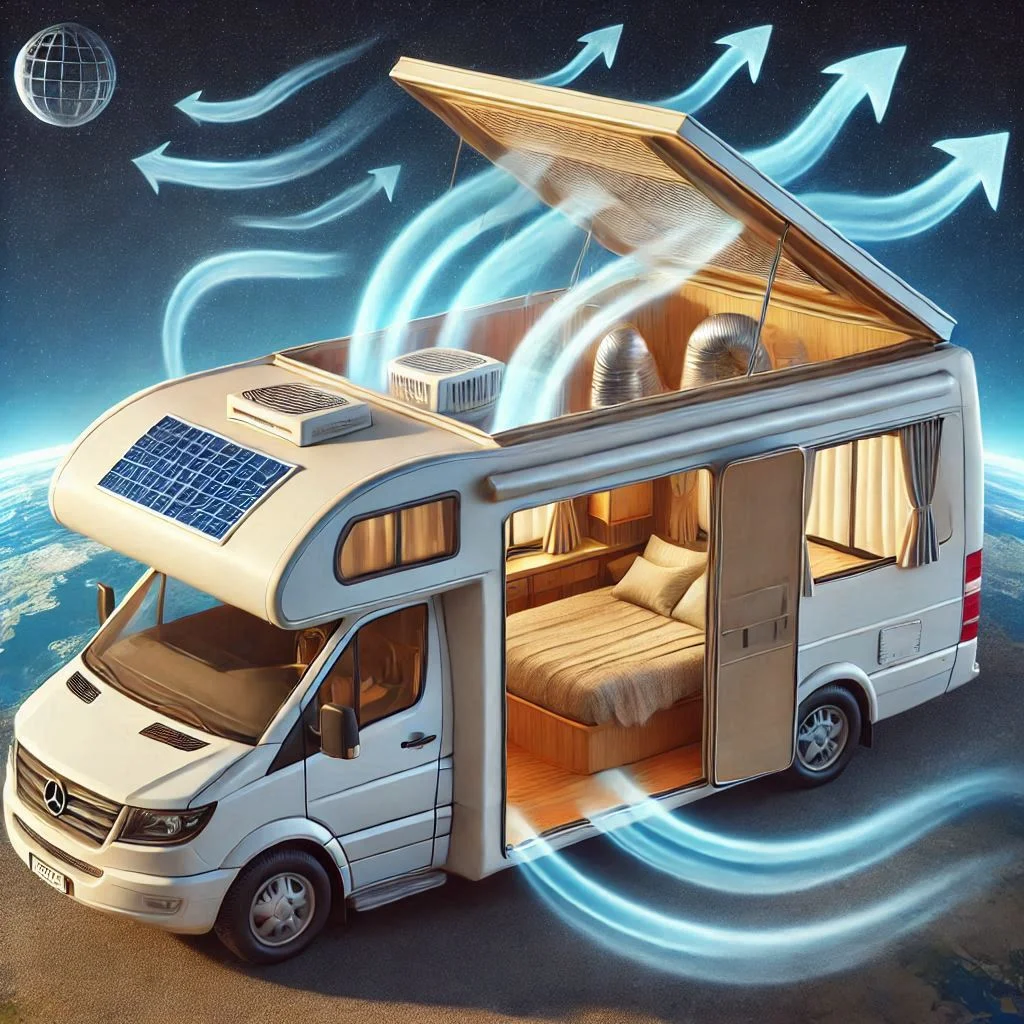
2. Insulation
Proper insulation plays a crucial role in keeping your camper van cool. It prevents the buildup of heat from the sun and keeps the cooler air inside. Here are some tips for enhancing insulation:
- Insulated Walls and Roof: Insulate your camper van with high-quality materials such as foam board or spray foam insulation. This helps maintain a consistent internal temperature, reducing the load on your AC unit.
- Reflective Insulation: Consider using reflective insulation materials, such as reflective bubble wrap, on windows and walls. This reduces heat gain from the sun’s rays, keeping the interior cooler.
- Insulating the Floor: The floor can be a significant source of heat gain. Adding an insulating material to the floor helps prevent heat transfer from the ground, keeping your van cooler on hot days.
- Thermal Curtains: Installing thermal curtains on your windows is a simple yet effective way to prevent the sun’s heat from entering the van. These curtains act as an additional layer of insulation.
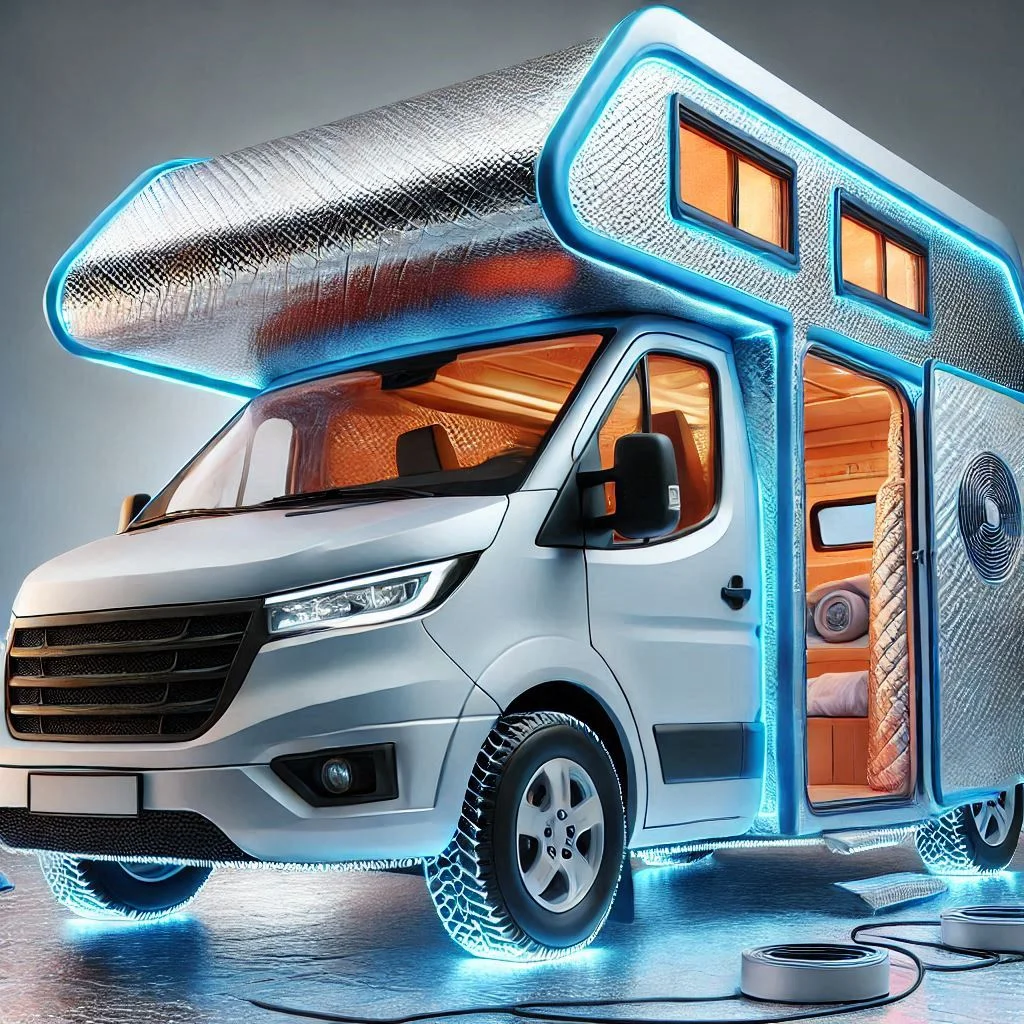
When to Use a Dehumidifier Along with the AC
In addition to optimizing ventilation and insulation, using a dehumidifier can significantly improve your camper van’s cooling efficiency, especially in humid climates. Humidity levels can make the air feel hotter than it actually is, and a dehumidifier helps combat this issue.
Why Use a Dehumidifier?
- Reduces Humidity: A dehumidifier lowers the moisture levels in the air, making it feel cooler. This helps your air conditioner to work more efficiently because it doesn’t have to cool down as much humidity.
- Prevents Mold and Mildew: Excess humidity can lead to mold and mildew buildup inside the camper van, especially in hidden spots. By controlling humidity, a dehumidifier prevents these issues and keeps your living space healthier.
- Improves Comfort: High humidity can make the air feel sticky and uncomfortable. Using a dehumidifier reduces this effect, allowing your AC to cool the space more effectively and making the air feel fresher.
How to Use a Dehumidifier with Your AC:
- Set the AC to Cool: While your air conditioner works to cool the air, the dehumidifier will extract excess moisture. Make sure to keep the AC running on a moderate setting to avoid over-cooling the space.
- Position the Dehumidifier Properly: Place the dehumidifier in a well-ventilated area of the camper van, preferably near a source of humidity, such as the kitchen or bathroom area. Ensure it is not obstructing airflow from the AC.
- Monitor Humidity Levels: Keep an eye on the humidity levels inside your camper van. A humidity level between 30-50% is ideal for comfort. If the humidity goes beyond this range, using a dehumidifier will help maintain optimal comfort levels.
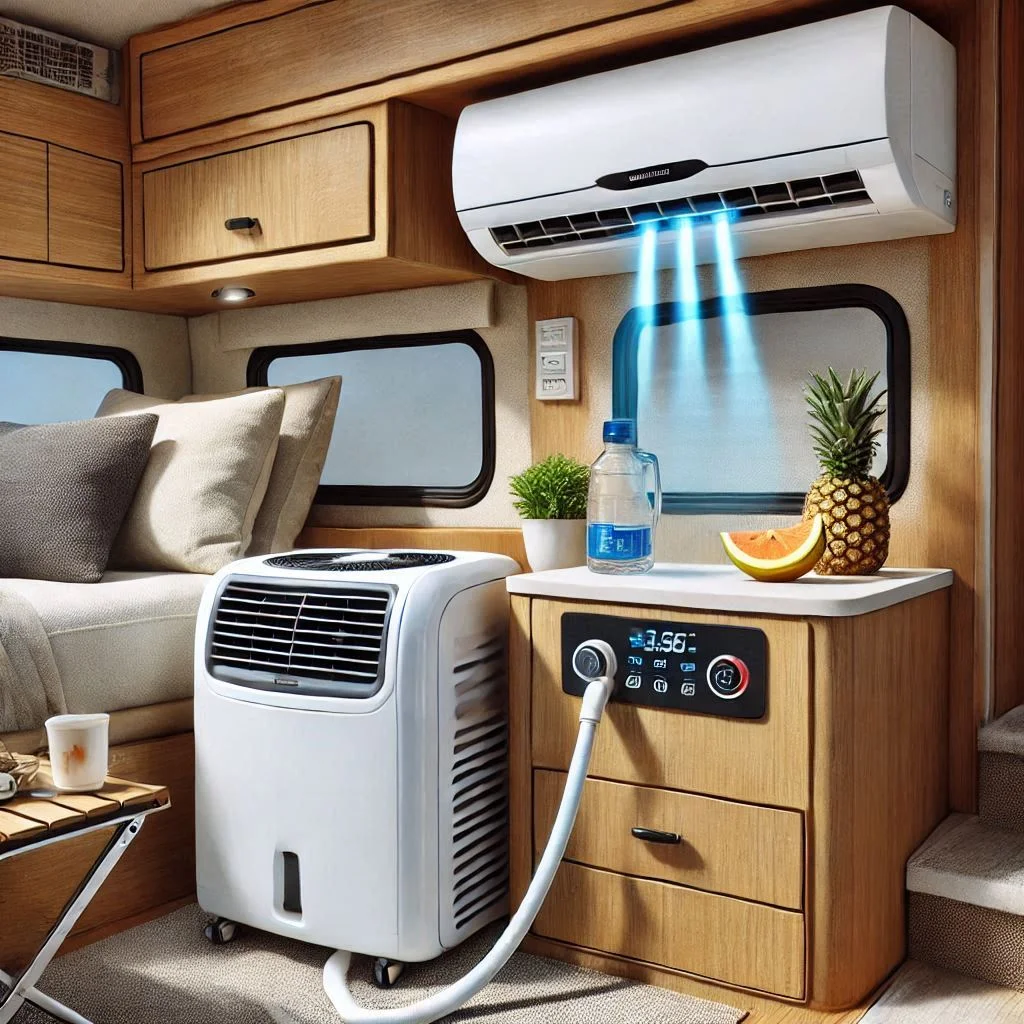
What Type of Air Conditioner is Best for a Camper Van?
Choosing the right type of air conditioner depends on your specific needs, including the size of your van, your budget, and your cooling requirements. There are several types of air conditioners available for camper vans:
1. Rooftop Air Conditioners:
- Best for: Those who have limited space inside the van.
- Pros: Efficient cooling, takes up no interior space, and typically quieter.
- Cons: Installation can be complex and may require roof modifications.
2. Non-Ducted Air Conditioners:
- Best for: Vans with limited space or those who need easy installation.
- Pros: Compact, lightweight, and straightforward to install.
- Cons: Cooling may not be as evenly distributed compared to ducted systems.
3. Ducted Air Conditioners:
- Best for: Larger vans or those seeking even air distribution.
- Pros: Offers consistent cooling throughout the van.
- Cons: Requires more space and installation work.
4. Portable Air Conditioners:
- Best for: Those who prefer flexibility and ease of installation.
- Pros: Can be moved around, easy to set up.
- Cons: Less powerful than fixed systems and takes up interior space.
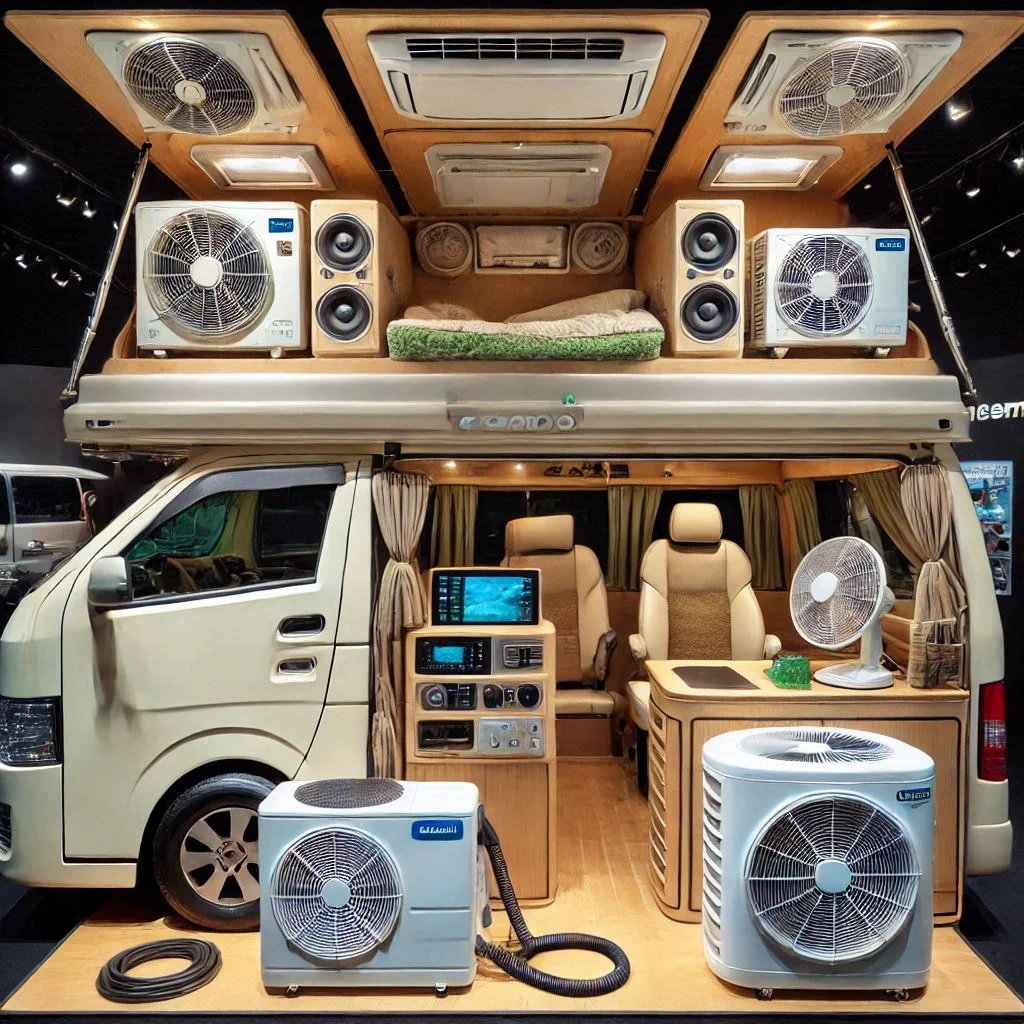
Can Solar Panels Power a Camper Van Air Conditioner?
Yes, solar panels can power a camper van air conditioner, but there are several factors to consider to ensure a seamless setup.
What You Need:
- High-Quality Solar Panels: Solar panels convert sunlight into electricity, providing a sustainable power source for your AC. However, solar panels alone may not generate enough power for long cooling sessions without proper setup.
- Sufficient Battery Storage: In addition to solar panels, you will need a deep-cycle battery to store the energy and provide a stable supply to the AC.
- Inverter: An inverter is necessary to convert DC power (from solar panels and batteries) into AC power, which is what most air conditioners run on.
Considerations:
- Power Consumption: A standard camper van air conditioner uses a significant amount of power. Ensure your solar system can provide adequate power for continuous cooling.
- Optimal Sunlight: Solar panels work best in sunny conditions, so make sure your van is parked in a sunny location during the day.
- Battery Capacity: To run the AC efficiently, the battery needs to be large enough to handle the energy consumption without draining too quickly.
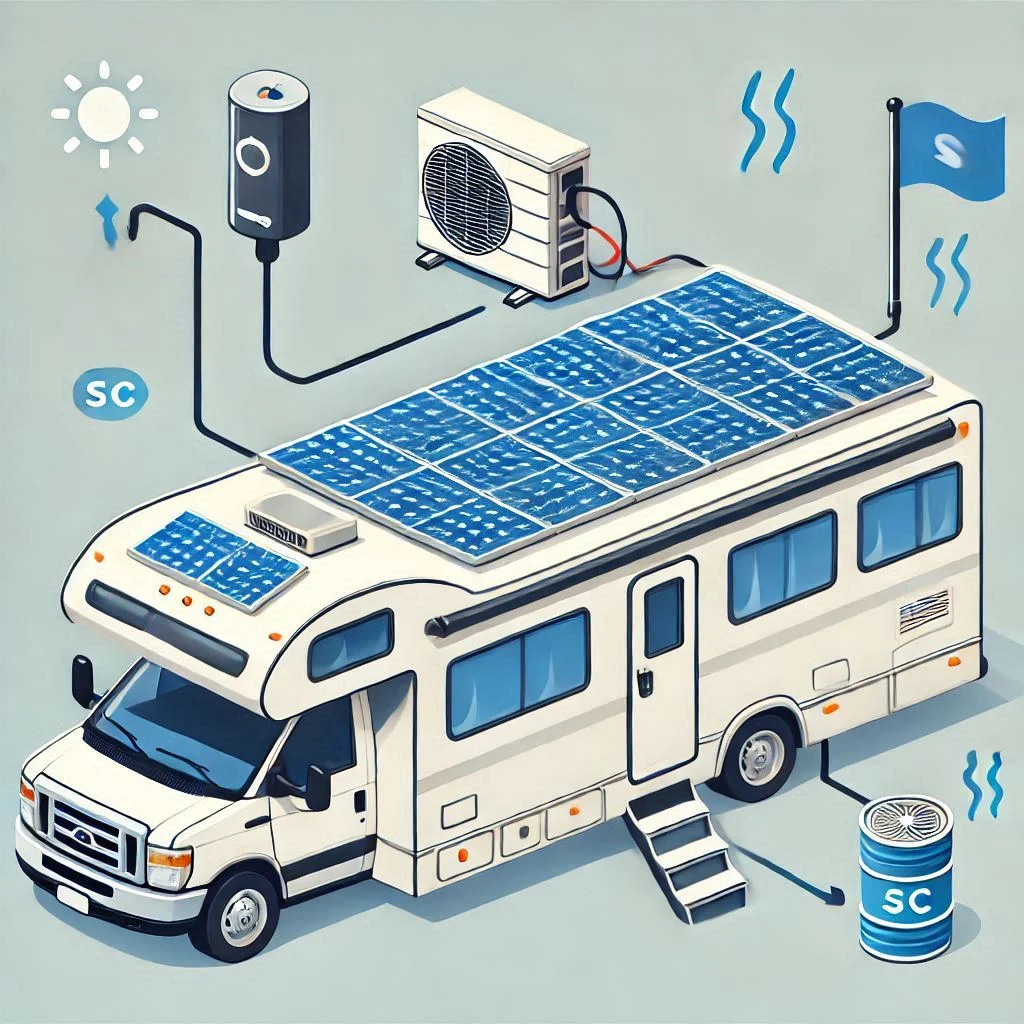
What’s the Best Portable Camper Van Air Conditioner?
Portable air conditioners offer flexibility for camper van owners who need a cool environment but want to avoid permanent installations. Here are some of the best portable AC units for camper vans:
1. Zero Breeze Mark 2:
- Why it’s best: Lightweight, powerful, and portable, making it a popular choice for van lifers.
- Features: It’s designed for easy transport and features efficient cooling despite its compact size.
2. Whynter ARC-14S:
- Why it’s best: It offers a high cooling capacity and is one of the most efficient portable air conditioners available.
- Features: It includes an automatic dehumidifier and a sleek, compact design ideal for limited space in camper vans.
3. Black + Decker BPACT14HWT:
- Why it’s best: This model is known for its affordability and ability to cool medium-sized spaces effectively.
- Features: It combines cooling and heating functionality, making it suitable for year-round use.
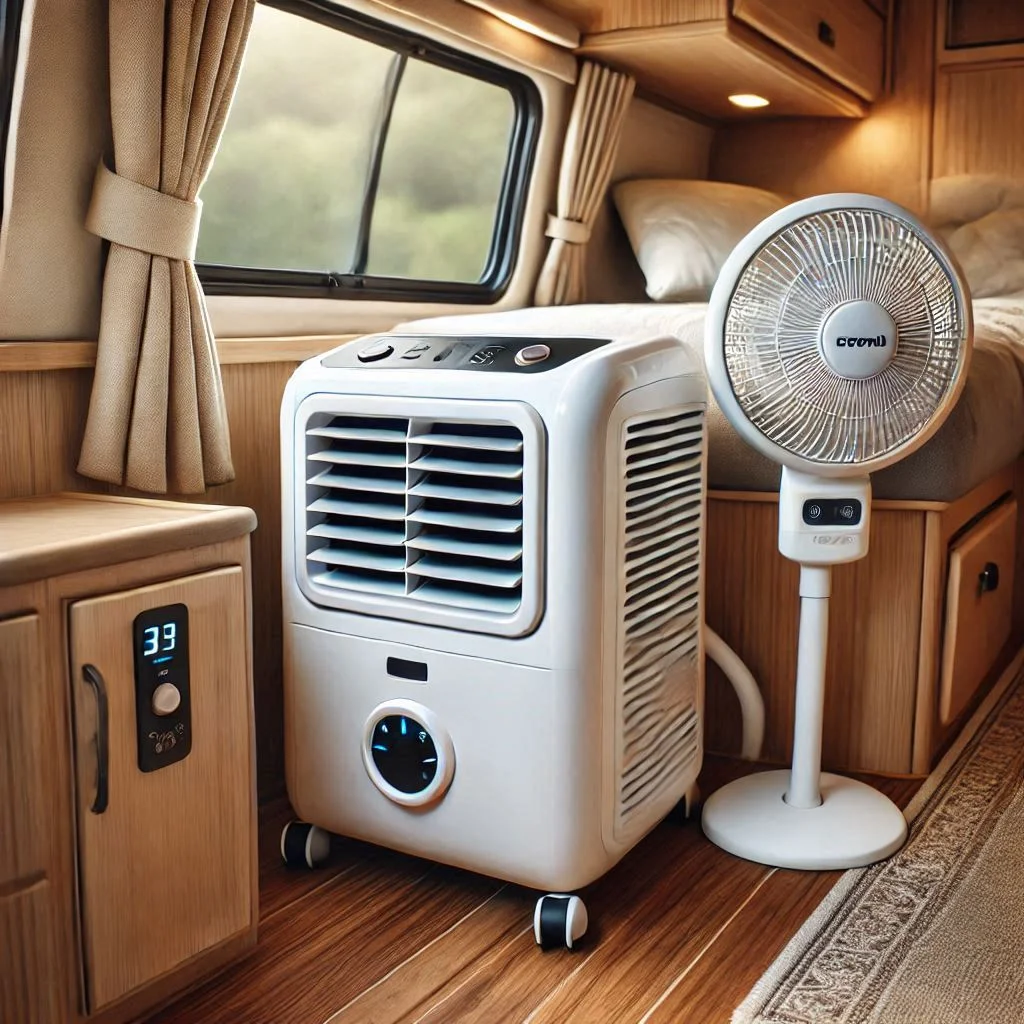
Should You Use a Dehumidifier with an Air Conditioner in Your Camper Van?
Yes, using a dehumidifier with your camper van air conditioner can provide several benefits, especially in humid climates.
Why Use a Dehumidifier?
- Improved Cooling Efficiency: By reducing the moisture in the air, a dehumidifier allows the AC to cool the space more effectively and at a faster rate.
- Prevent Mold and Mildew: High humidity can lead to mold and mildew inside your van. A dehumidifier helps control moisture levels, keeping your van’s interior healthier.
- Increased Comfort: Humidity can make the air feel warmer than it is. By removing excess moisture, a dehumidifier helps maintain a more comfortable environment inside your van.
How to Use a Dehumidifier with Your AC:
- Simultaneously Running: Run both the dehumidifier and AC at the same time to ensure both moisture is extracted and the air is cooled.
- Energy Efficiency: If you’re concerned about energy consumption, choose an energy-efficient dehumidifier that works well with your AC system.
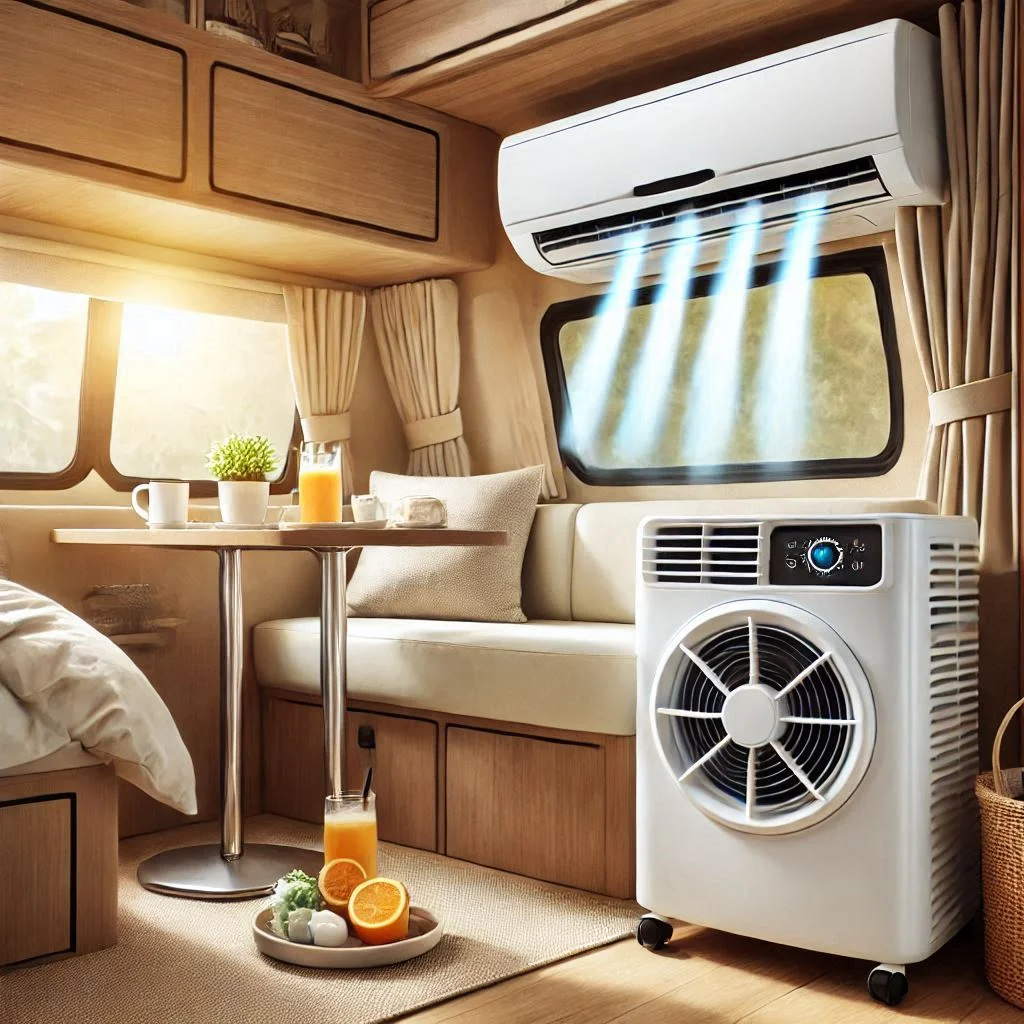
Conclusion
In conclusion, selecting the best air conditioner for your camper van requires careful consideration of various factors, including efficiency, cooling capacity, noise levels, and ease of installation. Whether you opt for a rooftop, ducted, non-ducted, or portable unit, it’s important to choose one that fits your specific needs and van size. Additionally, power considerations such as solar panels, battery storage, and energy consumption will play a crucial role in maintaining a comfortable environment on the road. By following the tips and guidelines outlined in this blog, you’ll be well-equipped to make an informed decision, ensuring your camper van remains cool and comfortable no matter where your journey takes you. With the right air conditioning system, your van life experience will be more enjoyable, efficient, and hassle-free.

